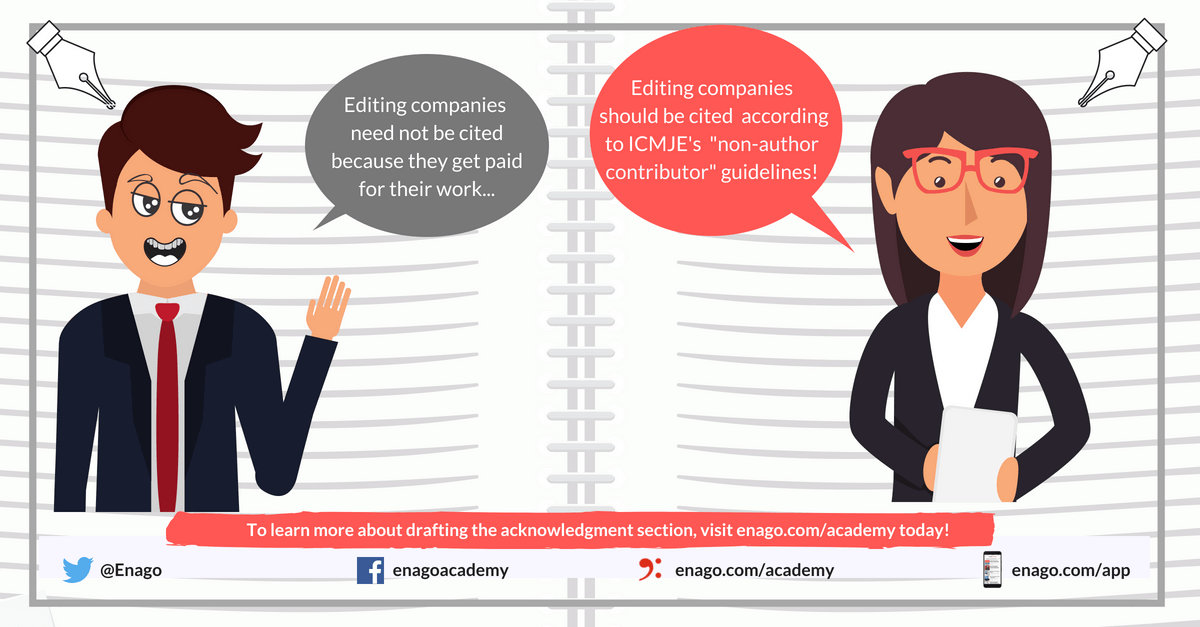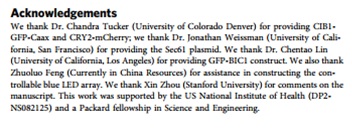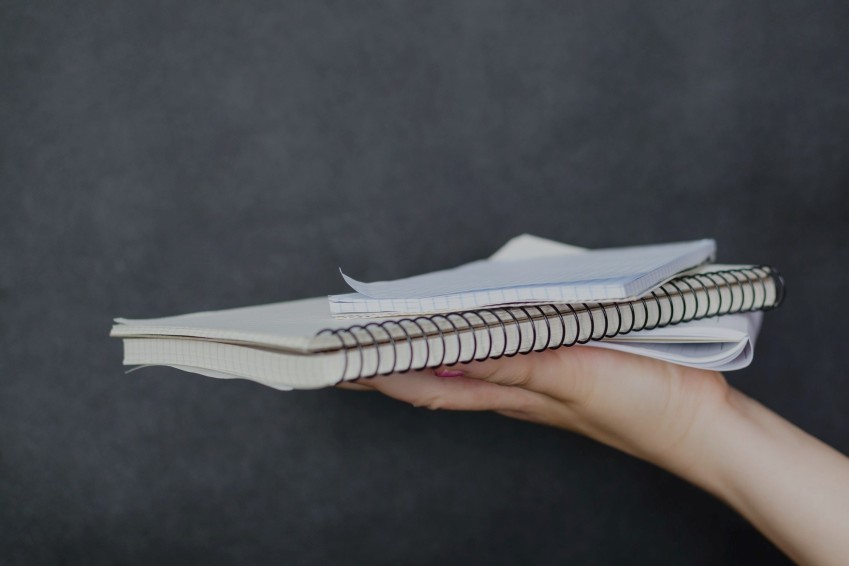

Acknowledgement in Research Paper – A Quick Guide [5 Examples]
The acknowledgement section in your research paper is where you thank those who have helped or supported you throughout your research and writing. It is a short section of 3-5 paragraphs or no more than 300 words you put on a page after the title page.
In this post, we are going to provide you with five examples of acknowlegdement section and a handful of best practices you can make your work look professional.

Saying thank you with style
How to write an acknowledgement: the complete guide for students, why should i include an acknowledgement in my research paper.
Acknowledging assistance and contributions from others can establish your integrity as a researcher. This will eventually make your work more credible.
What should be acknowledged about (aka thankful for)?
In your acknowledgement, you can show gratitude for those who provide you with resources in the following area:
- Technical help may include people who helped you by providing materials and supplies.
- Intellectual help includes academic advice and assistance.
- Mental help can be any kind of verbal support and encouragement.
- Financial support that is obviously related to monetary support
Who should be included in the acknowledgement of a research paper?
You can include everyone who helped you technically, intellectually, or financially (assistance with grants or monetary help) in the process of researching and writing your research paper. Except for your family and friends, you should always include the full names with the title of these individuals:
- Your profession, supervisor, or teacher
- Academic staff (e.g. lab assistant) of your school/college
- Your department, faculty, college, or school
- Classmates, teammates, co-workers, or colleague
- Friends and family members
You can start with your professor or the individuals who supported you the most throughout the research. And then you can continue by thanking your institution and then the reviewer who reviewed your paper. Then you can thank your friends and families and any other individual who helped.
What is the tone of the acknowledgement in a research paper?
You should write your acknowledgement in formal language with complete sentences. It is appropriate to write in the first person (‘I’ for a single author or ‘we’ for two or more).
Note that personal pronouns such as ‘I, my, me …’ are nearly always used in the acknowledgements only. For the rest of the research paper, such personal pronouns are generally avoided.
Writing an acknowledgement for research paper is one of the important parts of your project report. You need to thank everyone for helping you with your paper . Here are some examples of acknowledgement for your research paper.
Acknowledgement in Research Paper: Example 1
Acknowledgement in research paper: example 2, acknowledgement in research paper: example 3, acknowledgement in research paper: example 4, acknowledgement in research paper: example 5.
You can use these or try to create your own version for your project report. Also, you can use our auto acknowledgement generator tool to automatically generate acknowledgement for your project.
Where should I put the acknowledgement section?
The acknowledgements section should appear between your title page and your introduction in your research paper.
How long is an acknowledgement in a research paper?
The acknowledgement section (usualy inserted as a page) of your research paper should consist of 3-5 paragraphs or no more than 300 words you put on a page after the title page.
Should I use the full names of family members in an acknowledgement?
You do not necessarily need to use the full name for your family and friends (it would sound pretty awkward to use the full name of your parent or spouse right?), you should always include the full names with the title for all other individuals in your acknowledgement.
Can I use “first person” in an acknowledgement?
Yes. It is appropriate to write in the first person (‘I’ for a single author or ‘we’ for two or more).
What is an acknowledgement in academic writing?
An acknowledgement is a page is where you show appreciation to people who helped or supported you intellectually, mentally, or financially in your academic writing.
It should be no longer than one page.

More Definitions on Acknowledgement
- Acknowledgement vs Empathy What is the Difference Between Acknowledgement and Empathy?
- Acknowledgement vs Acceptance Does Acknowledgement Mean Acceptance? Lessons From History and the Bible
- Acknowledgement vs Agreement Is Acknowledgement the Same as Agreement?
- Acknowledgement Receipts vs Official Receipts What’s the Difference Between Acknowledgement Receipts and Official Receipts?
“Acknowledgement” vs “Acknowledgment”… …what the hack?

Both “acknowledgement” and “acknowledgment” are used in the English-speaking world. However, acknowledgement with the “e” in the middle is more commonly used. It is up to 24.5 times more popular in the top 5 English-speaking countries in the world.
Other Popular Acknowledgement Examples
For work or business Acknowledgement Receipt of Payment [4 Examples] Acknowledging Receipt of Documents: A Quick Guide with Examples Acknowledgement for Presentation [9 Examples] Acknowledgement for Job Offer [3 Examples] Acknowledgement for Business Plan [4 Examples] Acknowledgement for Work Immersion [5 Examples] Acknowledgement of Receipt of Appraisal [3 Examples] Acknowledegment of Debt [5 Examples] Resignation Acknowledgement for Employers [5 Examples]
Academic Acknowledgement for Research Paper [5 Examples] Acknowledgement for Internship Report [5 Examples] Acknowledgement for Thesis and Dissertation [15 Examples] Acknowledgement for Portfolio [5 Examples] Acknowledgement for Case Study [4 Examples] Acknowledgement for Academic Research Paper [5 Examples] Acknowledgement for College/School Assignment [5 Examples] Acknowledgemet to God in Reports [5 Examples]
Others Acknowledgement to Funeral Attendees [5 Examples] Funeral Acknowledgement Templates (for Newspapers and Websites) Common Website Disclaimers to Protect Your Online Business Notary Acknowledgement [5 Examples]
Acknowledgement Examples for School/College Projects
Most popular Acknowledgement For School/College Projects [7 Examples] Acknowledgement for English Project [5 Examples] Acknowledgement for Project Class 11 and 12 Acknowledgement for Project of Class 8, 9 and 10 By subjects Acknowledgement for Accounting Project [3 Examples] Acknowledgement for Business Studies Project [5 Examples] Acknowledgement for Chemistry Project [5 Examples] Acknowledgement for Computer Project [5 Examples] Acknowledgement for Economics Project [5 Examples] Acknowledgement for English Project [5 Examples] Acknowledgement for Geography Project [5 Examples] Acknowledgement for History Project [5 Examples] Acknowledgement for Maths Project for Students [5 Examples] Acknowledgement for Physics Project [5 Examples] Acknowledgement for Social Science Project [5 Examples] Others Acknowledgement for Group Project [5 Examples] Acknowledgement for Graduation Project [5 Examples] Acknowledgement for Disaster Management Project [3 Examples] Acknowledgement for Yoga Project [3 Samples]
How-to Guides on Academic Writing and Others
Most popular How to Write an Acknowledgement: The Complete Guide for Students How to Write an Acknowledgement for College Project? How to Write a Dedication Page for a Thesis or Dissertation? More on acknowledgements How to Write Acknowledgment for a Dissertation or a Thesis? Is Acknowledgement and Dedication the Same? Thesis or Dissertation How to Write a Master’s Thesis: The Ultimate Guide How to Write a Thesis Proposal? How to Write an Abstract for a Thesis? How to Write a Preface for a Thesis? Others How to Write an Introduction for a Research Paper? 7 Real Research Paper Examples to Get You Started How to Write Cover Letter for an Internship Program? How to Write an Internship Acceptance Letter? How to Write a Leave Application? For Schools and the Workplace How to Write a Resignation Letter?
Introduction to Academic Writing
By O.P. Jindal Global University Duration: 16-hour Cost: FREE Gain an in-depth understanding of reading and writing as essential skills to conduct robust and critical research for your writing.
Writing in English at University
By Lund University Duration: 24-hour Cost: FREE Learn how to structure your text and arguments, quote sources, and incorporate editing and proofreading in your academic writing.
Academic English: Writing Specialization
By the University of California, Irvine Duration: 6 months Cost: Free 7-day trial, USD39 per month The skills taught in this Specialization will empower you to succeed in any college-level course or professional field. You’ll learn to conduct rigorous academic research and to express your ideas clearly in an academic format. Share your Course Certificates in your LinkedIn profile, on printed resumes, CVs, or other documents.

Thank you, your samples really helped me.
This is great! Your samples really helped me in my research. Thank you and more power!
I’m so grateful that you make this kind of blog, I really need this for my research. Thank you so much… God bless you.
Thank you so much for the samples you have provided, it has helped me a lot.
Leave a Comment Cancel Reply
Your email address will not be published. Required fields are marked *
Save my name, email, and website in this browser for the next time I comment.

Thesis Acknowledgements Examples
5 Examples For Your Inspiration
By: Derek Jansen (MBA) | Reviewers: Dr Eunice Rautenbach | May 2024
The acknowledgements section of your thesis or dissertation is an opportunity to say thanks to all the people who helped you along your research journey. In this post, we’ll share five thesis acknowledgement examples to provide you with some inspiration.
Overview: Acknowledgements Examples
- The acknowledgements 101
- Example: Formal and professional
- Example: Warm and personal
- Example: Challenge-centric
- Example: Institution-centric
- Example: Reflective and philosophical
- FREE Acknowledgements template
Acknowledgements 101: The Basics
The acknowledgements section in your thesis or dissertation is where you express gratitude to those who helped bring your project to fruition. This section is typically brief (a page or less) and less formal, but it’s crucial to thank the right individuals in the right order .
As a rule of thumb, you’ll usually begin with academic support : your supervisors, advisors, and faculty members. Next, you’ll acknowledge any funding bodies or sponsors that supported your research. You’ll then follow this with your intellectual contributors , such as colleagues and peers. Lastly, you’ll typically thank your personal support network , including family, friends, and even pets who offered emotional support during your studies.
As you can probably see, this order moves from the most formal acknowledgements to the least . Typically, your supervisor is mentioned first, due to their significant role in guiding and potentially evaluating your work. However, while this structure is recommended, it’s essential to adapt it based on any specific guidelines from your university. So, be sure to always check (and adhere to) any requirements or norms specific to your university.
With that groundwork laid, let’s look at a few dissertation and thesis acknowledgement examples . If you’d like more, check out our collection of dissertation examples here .
Need a helping hand?
Example #1: Formal and Professional
This acknowledgement formally expresses gratitude to academic mentors and peers, emphasising professional support and academic guidance.
I extend my deepest gratitude to my supervisor, Professor Jane Smith, for her unwavering support and insightful critiques throughout my research journey. Her deep commitment to academic excellence and meticulous attention to detail have significantly shaped this dissertation. I am equally thankful to the members of my thesis committee, Dr. John Doe and Dr. Emily White, for their constructive feedback and essential suggestions that enhanced the quality of my work.
My appreciation also goes to the faculty and staff in the Department of Biology at University College London, whose resources and assistance have been invaluable. I would also like to acknowledge my peers for their camaraderie and the stimulating discussions that inspired me throughout my academic journey. Their collective wisdom and encouragement have been a cornerstone of my research experience.
Finally, my sincere thanks to the technical staff whose expertise in managing laboratory equipment was crucial for my experiments. Their patience and readiness to assist at all times have left a profound impact on the completion of my project.
Example #2: Warm and Personal
This acknowledgement warmly credits the emotional and personal support received from family, friends and an approachable mentor during the research process.
This thesis is a reflection of the unwavering support and boundless love I received from my family and friends during this challenging academic pursuit. I owe an immense debt of gratitude to my parents, who nurtured my curiosity and supported my educational endeavours from the very beginning.
To my partner, Alex, your endless patience and understanding, especially during the most demanding phases of this research, have been my anchor. A heartfelt thank you to my supervisor, Dr. Mark Brown, whose mentorship extended beyond the academic realm into personal guidance, providing comfort and motivation during tough times.
I am also thankful for my friends, who provided both distractions when needed and encouragement when it seemed impossible to continue. The discussions and unwavering support from my peers at the university have enriched my research experience, making this journey not only possible but also enjoyable. Their presence and insights have been pivotal in navigating the complexities of my research topic.
Example #3: Inclusive of Challenges
This acknowledgement recognises the wide range of support received during unexpected personal and academic challenges, highlighting resilience and communal support.
The path to completing this dissertation has been fraught with both professional challenges and personal adversities. I am profoundly grateful for the enduring support of my supervisor, Dr. Lisa Green, whose steadfast belief in my capabilities and academic potential encouraged me to persevere even during my lowest moments. Her guidance was a beacon of light in times of doubt.
I must also express my deepest appreciation for my family, who stepped in not only with emotional reassurance, but also with critical financial support, when unexpected personal challenges arose. Their unconditional love and sacrifice have been the foundation of my resilience and success.
I am thankful, too, for the support services at the university, including the counselling centre, whose staff provided me with the tools to manage stress and maintain focus on my academic goals. Each of these individuals and institutions played a crucial role in my journey, reminding me that the pursuit of knowledge is not a solo expedition but a communal effort.
Example #4: Institution-Centric
This acknowledgement succinctly appreciates the financial, academic, and operational support provided by the university and its staff.
This dissertation would not have been possible without the generous financial support from the University of Edinburgh Scholarship Programme, which enabled me to focus fully on my research without financial burden. I am profoundly grateful to my advisor, Professor Richard Miles, for his sage advice, rigorous academic guidance, and the confidence he instilled in me. His expertise in the field of microbiology greatly enriched my work.
I would also like to thank the staff at the university library, whose assistance was indispensable. Their patience and willingness to help locate rare and essential resources facilitated a thorough and comprehensive literature review. Additionally, the administrative and technical staff, who often go unmentioned, provided necessary support that greatly enhanced my research experience. Their dedication and hard work create an environment conducive to academic success.
Lastly, my peers’ encouragement and the intellectual environment at the university have been vital in completing my research.
Example #5: Reflective and philosophical
This acknowledgement reflects on the philosophical growth and personal insights gained through the support of mentors, peers, and family, framing the dissertation as a journey of intellectual discovery.
Completing this thesis has been not only an academic challenge but also a profound journey of personal and philosophical growth.
I am immensely grateful to my mentor, Professor Sarah Johnson, for encouraging me to explore complex ideas and to challenge conventional wisdom. Her guidance helped me navigate the philosophical underpinnings of my research and deepened my analytical skills. My fellow students in the Philosophy Department provided a supportive and intellectually stimulating community. Our discussions extended beyond the classroom, offering new insights and perspectives that were crucial to my thesis.
I am also deeply thankful for my family, whose intellectual curiosity and spirited philosophical debates at home sparked my interest in philosophy from a young age. Their continuous support and belief in my academic pursuits have been instrumental in my success.
This dissertation reflects not only my work but also the collective support of everyone who has touched my life academically and personally. The journey has taught me the value of questioning and the importance of diverse perspectives in enriching our understanding of complex philosophical issues.

FREE Acknowledgements Template
To help fast-track your writing process, we’ve created a free, fully editable template . This template covers all the necessary content for a generic thesis or dissertation acknowledgements section. If you’re interested, you can download a copy here .

Psst... there’s more!
This post was based on one of our popular Research Bootcamps . If you're working on a research project, you'll definitely want to check this out ...
You Might Also Like:

Submit a Comment Cancel reply
Your email address will not be published. Required fields are marked *
Save my name, email, and website in this browser for the next time I comment.
- Print Friendly
- SpringerLink shop
Acknowledgments and References
Acknowledgments.
This usually follows the Discussion and Conclusions sections. Its purpose is to thank all of the people who helped with the research but did not qualify for authorship (check the target journal’s Instructions for Authors for authorship guidelines). Acknowledge anyone who provided intellectual assistance, technical help (including with writing and editing), or special equipment or materials.
TIP: The International Committee of Medical Journal Editors has detailed guidelines on who to list as an author and who to include in the Acknowledgments that are useful for scientists in all fields.
Some journals request that you use this section to provide information about funding by including specific grant numbers and titles. Check your target journal’s instruction for authors for specific instructions. If you need to include funding information, list the name(s) of the funding organization(s) in full, and identify which authors received funding for what.
As references have an important role in many parts of a manuscript, failure to sufficiently cite other work can reduce your chances of being published. Every statement of fact or description of previous findings requires a supporting reference.
TIP: Be sure to cite publications whose results disagree with yours. Not citing conflicting work will make readers wonder whether you are really familiar with the research literature. Citing conflicting work is also a chance to explain why you think your results are different.
It is also important to be concise. You need to meet all the above needs without overwhelming the reader with too many references—only the most relevant and recent articles need to be cited. There is no correct number of references for a manuscript, but be sure to check the journal’s guidelines to see whether it has limits on numbers of references.
TIP: Never cite a publication based on what you have read in a different publication (such as a review), or based only on the publication’s abstract. These may mislead you and readers. Read the publication itself before you cite it, and then check the accuracy of the citation again before submitting your manuscript.
You should reference other work to:
- Establish the origin of ideas
When you refer to an idea or theory, it is important to let your readers know which researcher(s) came up with the idea. By citing publications that have influenced your own work, you give credit to the authors and help others evaluate the importance of particular publications. Acknowledging others’ contributions is also an important ethical principle.
- Justify claims
In a scientific manuscript, all statements must be supported with evidence. This evidence can come from the results of the current research, common knowledge, or from previous publications. A citation after a claim makes it clear which previous study supports the claim.
- Provide a context for your work
By highlighting related works, citations help show how a manuscript fits into the bigger picture of scientific research. When readers understand what previous studies found and what puzzles or controversies your study relates to, they will better understand the meaning of your work.
- Show there is interest your field of research
Citations show that other researchers are performing work similar to your own. Having current citations will help journal editors see that there is a potential audience for your manuscript.
Back │ Next
- Link to facebook
- Link to linkedin
- Link to twitter
- Link to youtube
- Writing Tips
How to Write Acknowledgements
- 2-minute read
- 25th March 2015
If you are near the end of your thesis, you can start to think about putting on the finishing touches . One thing you will have to do here is write your acknowledgements. A lot of people worry about this, but there’s really no need. As we are about to show, it’s actually quite simple!
What Are Acknowledgements?
The acknowledgement section of a thesis is where you can thank everyone who has helped you in your research. It is typically located at the beginning of your thesis, right after the contents page, and shouldn’t really be more than one or two pages long. The best thing to do is to keep it concise.
Who Should I Thank?
Think about the people who were of crucial importance during your research. This could include friends, family or professors, or even volunteers who have taken part in your research. It’s also important to acknowledge professional bodies who have given you funding or other help.
How Should I Write It?
There are no strict requirements for the tone of your acknowledgements; it’s essentially the one section where you can be a little bit more informal! Try to make sure the tone fits the person or organization you’re thanking, though, maintaining a formal approach when addressing funding bodies or other official groups.
Find this useful?
Subscribe to our newsletter and get writing tips from our editors straight to your inbox.
Other than trying to be concise, the main thing you should keep in mind is varying your language, if only because starting every sentence with “I would like to thank…” will sound a bit dull.
There are several ways you could word your thanks. A few suggestions are:
- This research would not have been possible without…
- My sincere thanks go to…
- I am grateful to…
- Heartfelt thanks to…
- I would like to express my gratitude to…
- Appreciation is due to…
- I acknowledge the contribution of…
- I am indebted to…
And that’s all there is to it! Relax and enjoy writing your acknowledgements. If you’ve got this far in the thesis-writing process, you’re over the toughest bit now! For more information about writing a dissertation or thesis, read our full dissertation writing guide .
Share this article:
Post A New Comment
Got content that needs a quick turnaround? Let us polish your work. Explore our editorial business services.
9-minute read
How to Use Infographics to Boost Your Presentation
Is your content getting noticed? Capturing and maintaining an audience’s attention is a challenge when...
8-minute read
Why Interactive PDFs Are Better for Engagement
Are you looking to enhance engagement and captivate your audience through your professional documents? Interactive...
7-minute read
Seven Key Strategies for Voice Search Optimization
Voice search optimization is rapidly shaping the digital landscape, requiring content professionals to adapt their...
4-minute read
Five Creative Ways to Showcase Your Digital Portfolio
Are you a creative freelancer looking to make a lasting impression on potential clients or...
How to Ace Slack Messaging for Contractors and Freelancers
Effective professional communication is an important skill for contractors and freelancers navigating remote work environments....
3-minute read
How to Insert a Text Box in a Google Doc
Google Docs is a powerful collaborative tool, and mastering its features can significantly enhance your...

Make sure your writing is the best it can be with our expert English proofreading and editing.
Reference management. Clean and simple.
Dissertation acknowledgments [with examples]

What are dissertation acknowledgements?
What to consider when writing your dissertation acknowledgments, who to thank in your dissertation acknowledgments, what (and what not) to write in your dissertation acknowledgments, good examples of dissertation acknowledgments, a final word on writing dissertation acknowledgments: have fun, frequently asked questions about dissertation acknowledgments, related articles.
While you may be the sole author of your dissertation, there are lots of people who help you through the process—from your formal dissertation advisors to the friends who may have cooked meals so that you could finish your last chapter . Dissertation acknowledgments are a chance to thank everyone who had a hand in the completion of your project.
Dissertation acknowledgments are a brief statement of your gratitude to advisors, professors, peers, family, and friends for their help and expertise.
In this guide, we’ll cover:
- the most important things to consider when you’re writing your dissertation acknowledgments
- who to thank in your dissertation acknowledgments
- what (and what not) to write in your dissertation acknowledgments
- short examples of dissertation acknowledgments
Once you’re at the stage where you’re writing your dissertation acknowledgments, you may be tempted to kick back and relax. After all, the hard part of writing the dissertation itself is over and a list of thanks should be simple to churn out.
However, the acknowledgments are an important part of your overall work and are something that most people who read your dissertation, including prospective employers, will look at.
Tip: The best dissertation acknowledgements are concise, sincere, and memorable.
Approach this part of the process, brief as it may be compared to the long haul of writing the dissertation, with the same high level of care and attention to detail. It’s an explicit and permanent statement of who made a real impact on your work and contributed to your academic success.
Plus, the people you thank are often deeply moved by being included—some even go so far as to frame the acknowledgments. Aim to make yours sincere, memorable and something that people will be touched by.
First things first: who should you include in your dissertation acknowledgments? If you’re not sure who to thank, try the brainstorming technique to generate some ideas. Consider these two approaches:
- Make a list of everyone, both professional and personal, who was involved at any point during your work on your dissertation, and then thin down the list from there.
- Make a list of the pivotal aspects of your process and think about who was involved and how they helped.
As you select the people and groups to include in your dissertation acknowledgments, keep in mind that it’s essential to acknowledge your supervisor and anyone else with a visible connection to your work.
It’s an unfortunate reality that not every supervisor goes above and beyond to provide feedback and guidance to the students they are supposed to supervise. However, leaving them out, even if you personally felt disappointed by their involvement or lack thereof, could be seen as a snub.
You should end up with a fairly short list of people to thank. While being mindful of professional etiquette and personal feelings, be choosy about who makes the final cut since your acknowledgments should be limited to no more than a page.
Now that you have your list of people and groups to thank, it’s time to start writing. Before your first pen or keystroke, however, check your university’s guidelines as your institution may have specific rules around what can and cannot be included.
The standard practice is to begin with the formal and then progress to the informal, so the first people to mention would be:
- supervisors
- committee members
- other professional contacts
Use their full names and titles and go into brief detail about how they contributed to your work.
Once those are done, you can move on to the personal thanks, which can include friends, family, even pets. If you are so inclined, it is also considered appropriate to thank God or make mention of spiritual support.
You may also choose to inject a little humor at this point, but don’t get carried away and definitely don’t include sarcasm or critical comments of any kind, including self-critical ones. Remember that the acknowledgments precede your dissertation, so you want to be taken seriously.
A couple more basics that are essential when creating your acknowledgments:
- Position: Acknowledgments should be placed after the title page and before the abstract.
- Perspective: Write from the first-person perspective and speak in your own voice.
A really good way to get a sense of how to write your own dissertation acknowledgments is to read ones written by others. Notice which ones you respond particularly well to and use them as a model upon which to base your own.
Here are some good examples to help you get started:
I couldn’t have reached this goal without the help of many people in my life. I’d like to take this opportunity to thank them for their support.
First, my sincere thanks to my dissertation committee. The value of their guidance cannot be overstated. Dr. Elaine Gooding and Dr. Matthew Hunter provided much wisdom that helped me chart my course. I couldn’t have asked for a better supervisor than Dr. Fiona Moore, whose knowledge and experience guided me every step of the way.
Next, I’d like to thank my partner, Elliott. Your votes of confidence kept me going when my spirits dipped. I couldn’t have done this without you.
Last but not least, I’d like to acknowledge the emotional support provided by my family and friends. We made it to the top of the mountain! I look forward to celebrating with all of you.
This example is shorter, but still contains the key components:
Several people played a decisive role in my success and I would like to take this opportunity to thank them.
My chair, Dr. Ronald Saulk, provided invaluable support and infinite patience and I am truly grateful for all of his wisdom and guidance. I also owe the entire staff of the Wilhelm Library a debt of gratitude. From tracking down books and arranging for interlibrary loans to keeping the coffee maker in the lobby well-stocked and in good working order, they offered the practical help and kind gestures that made all the difference.
I’d also like to thank my family and God, for always being there for me.
One final piece of advice: enjoy this process. Writing a dissertation doesn’t happen every day, and the opportunity to acknowledge the important people in your life in a published format is as rare as it is wonderful.
What’s more, this part of your dissertation is unlike any other. It’s unbounded by the conventions that apply to the formal work. It’s a chance to really flex some creative muscle and let your personality shine through. So make the most of it and have fun!
In your dissertation acknowledgments, you thank everyone who has contributed to your work or supported you along the way. Who you want to thank is a very personal choice, but you should include your supervisors and anyone else with a visible connection to your work. You may also thank friends, family, and partners.
First, you need to come up with a list of people you want to thank in your dissertation acknowledgments. As a next step, begin with the formal and then progress to the informal, so the first people to mention would be supervisors, mentors, committees, and other professional contacts. Then, you can move on to the personal thanks, which can include friends, family, even pets.
Who you acknowledge in your dissertation is ultimately up to you. You should, however, thank your supervisor and anyone else with a visible connection to your work. Leaving them out, even if you personally felt disappointed by their involvement or lack thereof, could be seen as a snub. In addition, you can thank friends, partners or family.
There are many ways so you can acknowledge your dissertation supervisor. Some examples can be found in this article above. If you need more examples, you can find them here .
While acknowledgments are usually more present in academic theses, they can also be a part of research papers. In academic theses, acknowledgments are usually found at the beginning, somewhere between abstract and introduction. In research papers, acknowledgments are usually found at the end of the paper.

Academia Bees
Acknowledgement for Paper Publication (10 Samples)
July 11, 2023
No Comments
By Mohsin Khurshid
Acknowledgement for paper publication is a crucial aspect that recognizes the contributions and support received throughout the research process. It holds significant value in academic papers, showcasing appreciation for the individuals and institutions that have played a role in the study’s success. In this article, we will delve into the importance of acknowledgement in paper publication and provide 10 comprehensive samples to guide you in crafting impactful acknowledgements for your own research. Whether you wish to acknowledge research collaborators, funding sources, mentors, or other individuals who have contributed to your work, these samples will assist you in expressing your gratitude effectively. Join us as we explore the art of acknowledgement and discover how to create acknowledgements that resonate with the collaborative nature of scholarly endeavors.
Table of Contents
- 1 Understanding the Importance of Acknowledgement
- 2.1 Sample 1 – Acknowledgement for Research Collaboration
- 2.2 Sample 2 – Acknowledgement for Funding Support
- 2.3 Sample 3 – Acknowledgement for Mentorship and Guidance
- 2.4 Sample 4 – Acknowledgement for Institutional Support
- 2.5 Sample 5 – Acknowledgement for Peer Reviewers
- 2.6 Sample 6 – Acknowledgement for Data and Materials
- 2.7 Sample 7 – Acknowledgement for Technical Assistance
- 2.8 Sample 8 – Acknowledgement for Editorial or Proofreading Assistance
- 2.9 Sample 9 – Acknowledgement for Inspiration and Support
- 2.10 Sample 10 – Acknowledgement for Personal Support
- 4 Conclusion
Understanding the Importance of Acknowledgement
Acknowledgement plays a crucial role in academic papers, serving multiple purposes within the scholarly community. Firstly, it provides an opportunity for authors to express gratitude and appreciation towards individuals, organizations, or institutions that have contributed to the research project in various ways. These contributions can include financial support, data collection assistance, intellectual guidance, or access to resources.
Beyond mere gratitude, acknowledgement serves as a means of giving credit where it is due. It recognizes the valuable input and collaboration of others, ensuring that their contributions are acknowledged and acknowledged by the academic community. By acknowledging the efforts of others, researchers uphold the principles of academic integrity and promote transparency in the research process.
Ethical considerations are also an integral part of writing an acknowledgement section. Authors must carefully navigate issues such as conflicts of interest, ensuring that they disclose any potential conflicts and maintain objectivity in their acknowledgements. Additionally, it is essential to respect the privacy and confidentiality of individuals mentioned in the acknowledgement, seeking their permission before including their names or affiliations.
Conventions related to acknowledgement may vary across disciplines and academic journals. Authors should familiarize themselves with the specific guidelines and requirements of their target journal to ensure compliance. Some journals may provide templates or specific instructions on how to structure the acknowledgement section, while others may have specific word limits or content restrictions.
In summary, understanding the importance of acknowledgement in academic papers is crucial for researchers. It serves as a means of expressing gratitude, giving credit to contributors, upholding academic integrity, and adhering to ethical considerations. By following conventions and guidelines specific to their field, authors can effectively convey their appreciation and recognition in the acknowledgement section of their paper.
10 Samples of Acknowledgement for Paper Publication
Explore these detailed samples of acknowledgements to effectively acknowledge contributors in your research papers.
Sample 1 – Acknowledgement for Research Collaboration
Acknowledging the collaborative efforts and contributions of research team members is a crucial aspect of the acknowledgement section in academic papers. The following is a detailed sample acknowledgement that demonstrates how to acknowledge research collaborators and team members:
I would like to express my sincere gratitude to the members of the research team who contributed to the successful completion of this study. Their dedication, expertise, and commitment were instrumental in the realization of our research objectives. I am thankful for their valuable insights, collaborative spirit, and unwavering support throughout the project.
I would like to extend my heartfelt appreciation to [Name], [Name], and [Name] for their invaluable contributions to the data collection process. Their meticulous efforts ensured the accuracy and reliability of our research findings. Additionally, I am grateful to [Name] for their assistance in data analysis and interpretation, which greatly enhanced the depth and quality of our research outcomes.
Furthermore, I would like to acknowledge the guidance and mentorship provided by [Name]. Their expertise in [area of expertise] was invaluable in shaping the direction of this research and refining our methodology. Their constructive feedback and insightful suggestions played a pivotal role in elevating the overall quality of this study.
I am also indebted to the support staff and administrators who facilitated the smooth operation of our research activities. Their assistance in securing necessary permissions, organizing logistics, and managing administrative tasks was vital to the success of this project.
Lastly, I would like to express my deep appreciation to the funding agency or organization that provided financial support for this research. Their investment in our work enabled us to conduct this study and make meaningful contributions to the field.
In conclusion, I am immensely grateful to all the individuals who contributed to this research collaboration. Their dedication, expertise, and unwavering support have been instrumental in the accomplishment of our research goals. Without their invaluable contributions, this study would not have been possible.
Sample 2 – Acknowledgement for Funding Support
Acknowledging the financial support received for research is an important aspect of the acknowledgement section in academic papers. The following is a detailed sample acknowledgement that demonstrates how to acknowledge funding support:
I would like to express my sincere appreciation to [Funding Agency/Organization] for their generous financial support of this research project. Their funding played a crucial role in the successful execution of this study and the attainment of our research goals.
The support provided by [Funding Agency/Organization] enabled us to conduct data collection, analysis, and interpretation, as well as cover expenses related to research materials, participant recruitment, and travel, where applicable. Their investment in our work has significantly contributed to the quality and impact of our research findings.
I would also like to extend my gratitude to the grant administrators and program officers at [Funding Agency/Organization] for their guidance and assistance throughout the grant application and management process. Their expertise and support were invaluable in ensuring a smooth and efficient funding experience.
Furthermore, I am grateful to my research team members and collaborators who have contributed their time, expertise, and efforts to this project. Their dedication and hard work have been instrumental in the successful completion of this research.
In conclusion, I am deeply thankful to [Funding Agency/Organization] for their financial support, without which this research would not have been possible. Their investment in our work has made a significant impact and has contributed to advancements in the field. I am truly grateful for their commitment to supporting research and fostering academic growth.
Sample 3 – Acknowledgement for Mentorship and Guidance
Acknowledging the contributions of mentors and advisors is essential in recognizing the guidance and support they have provided throughout the research process. The following is a detailed sample acknowledgement that demonstrates how to acknowledge mentorship and guidance:
I would like to express my heartfelt gratitude to my mentor, [Mentor’s Name], for their invaluable guidance, expertise, and support throughout the course of this research. Their extensive knowledge, insightful feedback, and unwavering encouragement have been instrumental in shaping the direction and quality of this study.
I am truly grateful for [Mentor’s Name]’s dedication and commitment to my academic growth. Their mentorship has not only expanded my understanding of the subject matter but has also enhanced my research skills and critical thinking abilities. Their willingness to invest their time and effort in providing guidance and constructive criticism has greatly contributed to the successful completion of this research project.
I would also like to extend my appreciation to [Advisor’s Name] for their valuable input and advice throughout the research process. Their expertise in [specific field or area] has been invaluable in shaping the methodology and interpretation of the findings. Their constructive feedback and thoughtful suggestions have significantly enhanced the quality and rigor of this study.
Furthermore, I would like to acknowledge the contributions of other members of my research committee, [Committee Member 1’s Name] and [Committee Member 2’s Name]. Their expertise and insights have provided valuable perspectives and have contributed to the overall excellence of this research.
In conclusion, I am sincerely grateful to my mentor, [Mentor’s Name], and my advisor, [Advisor’s Name], for their unwavering support and guidance. Their mentorship and expertise have been transformative in my academic journey, and I am privileged to have had the opportunity to learn from their wisdom and experience.
Sample 4 – Acknowledgement for Institutional Support
Acknowledging the support and resources provided by institutions is crucial in recognizing their contribution to the research project. The following is a detailed sample acknowledgement that demonstrates how to acknowledge institutional support:
I would like to express my sincere gratitude to [Institution’s Name] for their unwavering support and provision of resources throughout the course of this research. The research facilities and infrastructure provided by [Institution’s Name] have played a significant role in the successful completion of this study.
I am grateful for the access to state-of-the-art laboratories, research materials, and technological resources offered by [Institution’s Name]. These resources have been instrumental in conducting experiments, gathering data, and analyzing findings. The research environment provided by [Institution’s Name] has fostered an atmosphere of innovation and collaboration, allowing for the pursuit of academic excellence.
I would also like to extend my appreciation to the administrative staff and personnel at [Institution’s Name] for their assistance and support throughout the research process. Their responsiveness and willingness to provide guidance on administrative matters have been invaluable.
Furthermore, I would like to acknowledge the financial support provided by [Institution’s Name]. The research grants and scholarships awarded by [Institution’s Name] have enabled the realization of this project and have alleviated the financial constraints associated with conducting research.
In conclusion, I am deeply grateful to [Institution’s Name] for their unwavering support, provision of resources, and financial assistance. Their commitment to promoting research and academic excellence has been instrumental in the successful completion of this study.
Sample 5 – Acknowledgement for Peer Reviewers
Acknowledging the contributions of peer reviewers is essential in recognizing their valuable feedback and input towards improving the quality of the research. The following is a detailed sample acknowledgement that demonstrates how to acknowledge peer reviewers:
I would like to extend my heartfelt appreciation to the anonymous peer reviewers who generously dedicated their time and expertise to review and provide constructive feedback on this research paper. Their insightful comments and suggestions have significantly enhanced the quality and rigor of this study.
The meticulous review process conducted by the peer reviewers has played a crucial role in strengthening the methodology, refining the arguments, and improving the overall clarity and coherence of the research. Their expertise and critical evaluation have helped in identifying and addressing potential gaps, ensuring the accuracy and validity of the findings.
I am grateful for the valuable contributions made by the peer reviewers in shaping this paper into its final form. Their commitment to scholarly excellence and their dedication to advancing the field have been instrumental in improving the quality and impact of this research.
While their identities remain anonymous, I would like to express my sincere gratitude to each and every peer reviewer who played a part in the review process. Their time, expertise, and feedback are deeply appreciated.
Sample 6 – Acknowledgement for Data and Materials
Acknowledging the sources of data, materials, or tools used in the research is crucial to give proper credit and recognition. The following is a detailed sample acknowledgement that demonstrates how to acknowledge data and materials:
I would like to express my sincere gratitude to [Name/Organization] for providing access to the [Specify the data/materials/tools] used in this research. Their contribution has been invaluable in facilitating the data collection process and enabling the analysis conducted in this study.
The [Specify the data/materials/tools] have played a pivotal role in the success of this research, providing essential insights, information, and resources that have contributed to the depth and quality of the findings. Without their support and cooperation, this research would not have been possible.
I am deeply appreciative of the efforts made by [Name/Organization] in making the [Specify the data/materials/tools] available and ensuring their reliability and relevance to the research objectives. Their commitment to data sharing and collaborative research has greatly enriched the outcomes of this study.
I would also like to extend my gratitude to the individuals involved in the collection, organization, and maintenance of the [Specify the data/materials/tools]. Their dedication and professionalism have been instrumental in making these resources accessible and usable for this research.
Sample 7 – Acknowledgement for Technical Assistance
Acknowledging the individuals or organizations that provided technical assistance is essential to recognize their contributions. The following is a detailed sample acknowledgement that demonstrates how to acknowledge technical support:
I would like to extend my sincere appreciation to [Name/Organization] for their invaluable technical assistance throughout the course of this research. Their expertise and support have played a crucial role in the successful execution of this project.
The technical assistance provided by [Name/Organization] has been instrumental in overcoming various challenges and ensuring the accuracy and reliability of the experimental procedures. Their guidance and knowledge have greatly enhanced the quality of the data collected and the interpretation of the results.
I am grateful for their willingness to share their expertise and resources, providing guidance on experimental techniques, troubleshooting technical issues, and offering valuable insights into data analysis. Their assistance has significantly contributed to the overall success of this research endeavor.
I would also like to express my gratitude to the individuals within [Name/Organization] who have directly contributed to this project. Their dedication, professionalism, and prompt response to queries have made the research process smoother and more efficient.
Sample 8 – Acknowledgement for Editorial or Proofreading Assistance
Acknowledging the individuals who have contributed to the editing and proofreading process is essential to recognize their valuable contributions. The following is a detailed sample acknowledgement that demonstrates how to acknowledge editorial or proofreading assistance:
I would like to express my sincere gratitude to [Name/Names] for their invaluable assistance in the editing and proofreading of this manuscript. Their keen attention to detail, expertise in language and grammar, and commitment to improving the clarity and readability of the content have significantly enhanced the quality of this work.
The diligent efforts of [Name/Names] in meticulously reviewing the manuscript, suggesting revisions, and providing valuable feedback have played a crucial role in refining the overall structure, organization, and coherence of the document. Their editorial skills have helped to ensure the accuracy and precision of the scientific content, enhancing the credibility and impact of the research findings.
I am deeply appreciative of their dedication and professionalism throughout the editing process. Their constructive criticism, insightful suggestions, and meticulous proofreading have greatly contributed to the refinement of the language, grammar, and style of this manuscript.
I would also like to extend my thanks to [Name/Names] for their timely and efficient collaboration, as well as their willingness to accommodate multiple rounds of revisions. Their commitment to excellence and their commitment to producing a polished final product are greatly appreciated.
Sample 9 – Acknowledgement for Inspiration and Support
Acknowledging the individuals or sources of inspiration that have contributed to the research is important in recognizing their impact on the project. The following is a detailed sample acknowledgement that demonstrates how to acknowledge inspiration and support:
I would like to express my heartfelt gratitude to [Name/Names] for their unwavering support and inspiration throughout this research endeavor. Their encouragement, guidance, and insightful discussions have been instrumental in shaping the direction and depth of this study.
The unwavering support of [Name/Names] has been a constant source of motivation, providing the necessary encouragement to overcome challenges and pursue innovative ideas. Their expertise, wisdom, and constructive feedback have played a pivotal role in refining the research objectives, methodology, and interpretation of findings.
I am also indebted to [Source/Event/Book/Quote] for serving as a source of inspiration and influencing the conceptual framework of this study. The [Source/Event/Book/Quote] has provided valuable insights and perspectives that have guided my thinking and contributed to the overall development of this research.
Additionally, I would like to acknowledge the support and understanding of my family, friends, and colleagues, whose unwavering belief in my abilities has sustained me throughout this research journey. Their encouragement, understanding, and patience have been invaluable, providing the necessary emotional support and creating an environment conducive to pursuing this endeavor.
Sample 10 – Acknowledgement for Personal Support
Acknowledging the emotional support provided by family, friends, and loved ones is essential in recognizing their role in the research process. The following is a detailed sample acknowledgement that demonstrates how to acknowledge personal support:
I would like to express my deepest appreciation to my family, friends, and loved ones for their unwavering support throughout this research journey. Their love, understanding, and encouragement have been the pillars that have kept me motivated and focused during challenging times.
To my [Family Member(s)], your unwavering belief in me and your constant encouragement have been the driving force behind my pursuit of this research. Your sacrifices, understanding, and patience have provided me with the necessary space and time to dedicate myself to this endeavor. I am forever grateful for your unconditional love and support.
I would also like to extend my gratitude to my dear friends who have been a source of inspiration and motivation. Your unwavering belief in my abilities, your listening ear, and your words of encouragement have given me the strength and confidence to overcome obstacles and pursue this research with dedication.
In addition, I am grateful to [Name(s)] for their continuous support, understanding, and patience. Their presence and unwavering support have provided me with the emotional stability and reassurance needed to navigate through the challenges of this research journey.
Finally, I want to express my heartfelt appreciation to all the participants who generously shared their time, experiences, and insights for this research. Without their willingness to contribute, this study would not have been possible.

Also, read tips and samples on writing acknowledgement for your internship report .
Writing an acknowledgement for a paper involves expressing gratitude to individuals or entities who have contributed to the research. It typically includes mentioning the names, roles, and specific contributions of those being acknowledged.
To acknowledge means to recognize and show appreciation for the contributions or support received. In the context of paper publication, it refers to acknowledging the individuals or organizations that have played a role in the research process.
In an acknowledgement section, you can express gratitude to individuals, institutions, or funding agencies that have supported or contributed to the research. You can mention their names, roles, and specific contributions in a sincere and respectful manner.
The correct spelling of “acknowledge” is A-C-K-N-O-W-L-E-D-G-E.
An acknowledgement statement refers to a written expression of gratitude and appreciation towards individuals or organizations for their contributions or support. It is a way to formally recognize their involvement in the research process and show gratitude for their assistance.
In conclusion, acknowledgement plays a vital role in paper publication, allowing researchers to express gratitude and recognize the contributions of individuals and institutions who have supported their work. By acknowledging research collaborators, mentors, funding sources, peer reviewers, and others, researchers demonstrate their appreciation and foster a sense of community within the academic sphere.
It is important to tailor acknowledgements to the specific research context, considering the unique contributions and support received throughout the research process. Each acknowledgement should reflect the genuine appreciation and recognition of those who have played a significant role in the success of the research.
As researchers, let us not underestimate the power of acknowledgement. It not only acknowledges the contributions of others but also serves as a reminder of the collaborative and interconnected nature of academic work. By expressing gratitude and recognizing the efforts of those who have supported us, we contribute to a positive research culture and encourage further collaboration and support in the academic community . In closing, let us remember that acknowledgement is not just a formality but a sincere gesture of appreciation. It is a way to honor the collaborative nature of research and the individuals and institutions that have contributed to our academic journey. May we continue to acknowledge and support one another as we advance knowledge and make meaningful contributions to our respective fields.
Rules for Dealing with Introverts: Complete Guide
How to write acknowledgement for research paper (5 samples), leave a comment cancel reply.
Save my name, email, and website in this browser for the next time I comment.

- Acknowledgements for PhD Thesis and Dissertations – Explained
- Doing a PhD
The Purpose of Acknowledgements
The acknowledgement section of a thesis or dissertation is where you recognise and thank those who supported you during your PhD. This can be but is not limited to individuals, institutions or organisations.
Although your acknowledgements will not be used to evaluate your work, it is still an important section of your thesis. This is because it can have a positive (or negative for that matter) influence the perception of your reader before they even reach the main body of your work.
Who Should I Acknowledge?
Acknowledgements for a PhD thesis will typically fall into one of two categories – professional or personal.
Within these categories, who you thank will ultimately be your decision. However, it’s imperative that you pay special attention to the ‘professional’ group. This is because not thanking someone who has played an important role in your studies, whether it be intentional or accidental, will more often than not be seen as a dismissal of their efforts. Not only would this be unfair if they genuinely helped you, but from a certain political aspect, it could also jeopardise any opportunities for future collaborations .
Professional Acknowledgements
This may include, but is not limited to:
- Funding bodies/sponsorship providers
- Supervisors
- Research group and lab assistants
- Research participants
- Proofreaders
Personal Acknowledgements
- Key family members and friends
- Individuals who inspired you or directly influenced your academic journey
- Anyone else who has provided personal support that you would like to mention
It should be noted that certain universities have policies which state only those who have directly supported your work, such as supervisors and professors, should be included in your acknowledgements. Therefore, we strongly recommend that you read your university guidelines before writing this section of your thesis.
How to Write Acknowledgements for PhD Thesis
When producing this section, your writing style can be more informal compared to the rest of your thesis. This includes writing in first person and using more emotive language. Although in most cases you will have complete freedom in how you write this section of your thesis, it is still highly advisable to keep it professional. As mentioned earlier, this is largely because it will be one of the first things your assessors will read, and so it will help set the tone for the rest of your work.
In terms of its structure, acknowledgements are expected to be ordered in a manner that first recognises the most formal support before moving onto the less formal support. In most cases, this follows the same order that we have outlined in the ‘Who Should I Thank’ section.
When thanking professionals, always write out their full name and provide their title. This is because although you may be on a first-name basis with them, those who read your thesis will not. By providing full names and titles, not only do you help ensure clarity, but it could also indirectly contribute to the credibility of your thesis should the individual you’re thanking be well known within your field.
If you intend to include a list of people from one institution or organisation, it is best to list their names in alphabetical order. The exception to this is when a particular individual has been of significant assistance; here, it would be advisable to list them.
How Long Should My Acknowledgements Be?
Acknowledgements vary considerably in length. Some are a single paragraph whilst some continue for up to three pages. The length of your acknowledgement page will mostly depend on the number of individuals you want to recognise.
As a general rule, try to keep your acknowledgements section to a single page. Although there are no word limits, creating a lengthy acknowledgements section dilutes the gratitude you’re trying to express, especially to those who have supported you the most.
Where Should My Acknowledgements Go?
In the vast majority of cases, your acknowledgements should appear directly after your abstract and before your table of contents.
However, we highly advise you to check your university guidelines as a few universities set out their own specific order which they will expect you to follow.
Phrases to Help You Get Started

We appreciate how difficult it can be to truly show how grateful you are to those who have supported you over the years, especially in words.
To help you get started, we’ve provided you with a few examples of sentences that you can complete or draw ideas from.
- I am deeply grateful to XXX…
- I would like to express my sincere gratitude to XXX…
- I would like to offer my special thanks to XXX…
- I would like to extend my sincere thanks to XXX…
- …for their assistance at every stage of the research project.
- …for their insightful comments and suggestions.
- …for their contribution to XXX.
- …for their unwavering support and belief in me.
Thesis Acknowledgement Examples
Below are three PhD thesis acknowledgment samples from which you can draw inspiration. It should be noted that the following have been extracted from theses which are freely available in the public domain. Irrespective of this, references to any individual, department or university have been removed for the sake of privacy.
First and foremost I am extremely grateful to my supervisors, Prof. XXX and Dr. XXX for their invaluable advice, continuous support, and patience during my PhD study. Their immense knowledge and plentiful experience have encouraged me in all the time of my academic research and daily life. I would also like to thank Dr. XXX and Dr. XXX for their technical support on my study. I would like to thank all the members in the XXX. It is their kind help and support that have made my study and life in the UK a wonderful time. Finally, I would like to express my gratitude to my parents, my wife and my children. Without their tremendous understanding and encouragement in the past few years, it would be impossible for me to complete my study.
I would like to thank my supervisors Dr. XXX and Dr. XXX for all their help and advice with this PhD. I would also like to thank my sisters, whom without this would have not been possible. I also appreciate all the support I received from the rest of my family. Lastly, I would like to thank the XXX for the studentship that allowed me to conduct this thesis.
I would like to thank my esteemed supervisor – Dr. XXX for his invaluable supervision, support and tutelage during the course of my PhD degree. My gratitude extends to the Faculty of XXX for the funding opportunity to undertake my studies at the Department of XXX, University of XXX. Additionally, I would like to express gratitude to Dr. XXX for her treasured support which was really influential in shaping my experiment methods and critiquing my results. I also thank Dr. XXX, Dr. XXX, Dr. XXX for their mentorship. I would like to thank my friends, lab mates, colleagues and research team – XXX, XXX, XXX, XXX for a cherished time spent together in the lab, and in social settings. My appreciation also goes out to my family and friends for their encouragement and support all through my studies.
Browse PhDs Now
Join thousands of students.
Join thousands of other students and stay up to date with the latest PhD programmes, funding opportunities and advice.
Recognizing Contributions: Acknowledge In Research Paper
Learn how to acknowledge in research paper with our simple guide, and ensure that your work gains recognition.
When we work on any project, it’s not just about our individual effort, it’s about teamwork as well. It’s important to acknowledge the contributions of others who have helped you along the way. This is where the acknowledgment section comes in. In this part of your paper, you can express your gratitude to those who have supported you throughout the research process, such as funders, advisors, assistants, collaborators, participants, and editors.
However, it’s important to be mindful of ethical considerations and avoid any promotion or advertising of specific individuals or organizations. In this guide, we’ll cover everything you need to know about acknowledgments, including how to acknowledge in research paper , tips for writing them, common mistakes to avoid, and ethical considerations. So, let’s get started!
What Is Acknowledgement In A Research Paper?
The acknowledgment section in a research paper credits individuals, institutions, or organizations that aided in the research or manuscript preparation. It’s usually found after the conclusion.
While optional, acknowledgments are commonly added to recognize and thank contributors for their efforts. This section typically starts with a statement thanking those who funded or supported the project, along with colleagues, research assistants, or other contributors who provided valuable feedback or assistance.
Being specific and detailing the contributions of each individual or organization is crucial to show their importance in the research process. However, it’s unnecessary to acknowledge everyone who helped, and acknowledgments should be kept brief and relevant to the project.
Why Is Acknowledgment Important?
Acknowledgment holds significant importance in research as it acknowledges and provides credit to individuals or organizations who have contributed to the research project. It expresses gratitude for their guidance, support, and assistance during the research process.
Acknowledgments are commonly included in research papers to build relationships and encourage future collaborations with those who have supported the research. By acknowledging their contributions, researchers demonstrate their appreciation for the input of others and the importance of collaboration in the research process.
Moreover, the acknowledgment section ensures academic integrity by recognizing and crediting all contributors to the research project. It also prevents any potential issues related to plagiarism or lack of attribution.
Who Should Be Acknowledged?
Acknowledgments in a research paper should recognize and give credit to individuals, organizations, or institutions that contributed to the research project in some way. This can include:
- Funding sources: Acknowledge those who provided financial support for the research project.
- Academic advisors or mentors: Acknowledge those who provided guidance or supervision throughout the research process.
- Research assistants: Acknowledge those who provided technical or administrative support during the research.
- Participants : Acknowledge those who took part in the research study, such as survey respondents.
- Collaborators : Acknowledge colleagues or other researchers who contributed to the research project in some way.
- Editors or proofreaders: Acknowledge those who helped with editing or proofreading the manuscript .
- Institutions or organizations: Acknowledge the institution or organization that provided resources or support for the research project.
Types Of Acknowledgement
Acknowledgment in a research paper can take various forms, depending on the purpose and context of the project. Here are some common types of acknowledgments:
1. Formal Acknowledgments
These are typically written in a formal tone and are used to recognize and give credit to people, organizations, or institutions that provide financial or technical support to the research project. These acknowledgments often appear at the beginning or end of the research paper and may include formal language and formatting.
2. Informal Acknowledgments
These acknowledgments are often more personal and informal in tone. They may include acknowledging friends, family members, or colleagues who provided emotional support or helped in some way during the research process.
3. Professional Acknowledgments
These acknowledgments are typically used in academic or professional settings and are aimed at giving credit to individuals or organizations that contributed to the research project. These acknowledgments may include thanking mentors, colleagues, research assistants, or funding agencies.
4. Collaborative Acknowledgments
These acknowledgments are used to recognize the collaborative nature of research projects. They may include acknowledging co-authors, collaborators, or other researchers who contributed to the project in some way.
Tips For Writing An Acknowledgement
When writing acknowledgment in a research paper, it’s important to keep the following tips in mind:
- Be specific: Clearly mention the contributions made by individuals or organizations, and how they helped in the research process.
- Use appropriate tone: Write in a professional tone and avoid using overly emotional language.
- Keep it concise: Avoid lengthy paragraphs and keep the acknowledgment section brief and relevant.
- Follow the required format: Check the guidelines provided by the journal or institution and ensure that you follow the required format.
- Proofread: Carefully proofread the acknowledgment section for any errors or typos.
- Be grateful: Show appreciation and gratitude to the individuals or organizations who contributed to the research project.
- Avoid self-promotion: The acknowledgment section should not be used to promote oneself or one’s organization.
Examples Of Acknowledgement
Examples of acknowledgments in a research paper include thanking the funding sources, academic advisors or mentors, research assistants, participants, collaborators, editors or proofreaders, and institutions or organizations that provided support. Here are some sample acknowledgments that are concise and relevant to the research project:
Acknowledge In Research Paper: Example 1
“I would like to thank Dr. Ram for his invaluable guidance and support throughout this project. I am also grateful to my research assistant, Priya, for her technical expertise and administrative assistance. This project would not have been possible without the generous financial support of the XYZ Foundation. Lastly, I would like to acknowledge the study participants who generously shared their time and insights.”

Acknowledge In Research Paper: Example 2
“I am indebted to Dr. Mary for her continuous support and feedback throughout the research process. I also want to thank my colleagues, Shahin and Sarah, for their valuable input and suggestions. The editorial assistance provided by XYZ Editing Services was also greatly appreciated. I am also grateful to the ABC Institution for providing the necessary resources for this research project.”
Common Mistakes To Avoid When Writing An Acknowledgement
When writing acknowledgment, it’s important to avoid certain mistakes, such as:
- Forgetting to acknowledge someone who contributed to the research project.
- Using vague language instead of specific details about how someone contributed.
- Focusing too much on personal anecdotes or stories, rather than keeping the acknowledgment concise and relevant to the research project.
- Using the acknowledgment section to promote or advertise specific individuals or organizations.
- Forgetting to proofread the acknowledgment section for errors in grammar or spelling.
- Including acknowledgments that are not relevant to the research project.
- Making it too formal or too casual, rather than matching the tone of the rest of the research paper.
To avoid these mistakes, it’s important to carefully consider who should be acknowledged, what specific contributions they made, and to keep the language concise and relevant to the research project. It’s also helpful to have someone else review the acknowledgment section to ensure that it’s free of errors and strikes the right tone.
How To Acknowledge In Research Paper?
- When citing an acknowledgment in a research paper, it should be listed as a separate section at the end of the paper, following the references section. It should be titled “Acknowledgement” and be placed after the conclusion but before the reference list.
- Acknowledgment section should not be included within the text citation or reference list. However, if a person or organization mentioned in the acknowledgment section was cited within the text, it should be included in the in-text citation and reference list.
- It’s important to make sure that acknowledgments are cited correctly in order to give credit to those who contributed to the research project. This will help to ensure academic integrity and avoid plagiarism. Learn more about Plagiarism here .
Ethical Considerations For Acknowledging Others In Your Research Paper
It is essential to consider ethical principles when acknowledging others in your research paper. First and foremost, ensure that you acknowledge all individuals and organizations that made significant contributions to your research. This acknowledgment must be honest and accurate and should not falsely claim credit for the work of others.
Additionally, it is crucial to obtain consent from individuals before acknowledging them in your research paper, particularly when using their personal information. Ensure that you have informed them about how their contribution will be acknowledged and seek their permission to do so.
The Best Infographic Maker And Overall Full-Stack Design Tool
Have you ever wondered how confused your audience would be if you published a plain text-based research paper with complex terms used within it? This is where the importance of visuals and graphics comes in. They help amplify your work by breaking the information with pictorial representation. Mind the Graph is the best infographic maker and full-stack design tool that helps to exemplify your research work. Sign up for free now!

Subscribe to our newsletter
Exclusive high quality content about effective visual communication in science.
Unlock Your Creativity
Create infographics, presentations and other scientifically-accurate designs without hassle — absolutely free for 7 days!
About Sowjanya Pedada
Sowjanya is a passionate writer and an avid reader. She holds MBA in Agribusiness Management and now is working as a content writer. She loves to play with words and hopes to make a difference in the world through her writings. Apart from writing, she is interested in reading fiction novels and doing craftwork. She also loves to travel and explore different cuisines and spend time with her family and friends.
Content tags
- Discoveries
- Right Journal
- Journal Metrics
- Journal Fit
- Abbreviation
- In-Text Citations
- Bibliographies
- Writing an Article
- Peer Review Types
- Acknowledgements
- Withdrawing a Paper
- Form Letter
- ISO, ANSI, CFR
- Google Scholar
- Journal Manuscript Editing
- Research Manuscript Editing
Book Editing
- Manuscript Editing Services
Medical Editing
- Bioscience Editing
- Physical Science Editing
- PhD Thesis Editing Services
- PhD Editing
- Master’s Proofreading
- Bachelor’s Editing
- Dissertation Proofreading Services
- Best Dissertation Proofreaders
- Masters Dissertation Proofreading
- PhD Proofreaders
- Proofreading PhD Thesis Price
- Journal Article Editing
- Book Editing Service
- Editing and Proofreading Services
- Research Paper Editing
- Medical Manuscript Editing
- Academic Editing
- Social Sciences Editing
- Academic Proofreading
- PhD Theses Editing
- Dissertation Proofreading
- Proofreading Rates UK
- Medical Proofreading
- PhD Proofreading Services UK
- Academic Proofreading Services UK
Medical Editing Services
- Life Science Editing
- Biomedical Editing
- Environmental Science Editing
- Pharmaceutical Science Editing
- Economics Editing
- Psychology Editing
- Sociology Editing
- Archaeology Editing
- History Paper Editing
- Anthropology Editing
- Law Paper Editing
- Engineering Paper Editing
- Technical Paper Editing
- Philosophy Editing
- PhD Dissertation Proofreading
- Lektorat Englisch
- Akademisches Lektorat
- Lektorat Englisch Preise
- Wissenschaftliches Lektorat
- Lektorat Doktorarbeit
PhD Thesis Editing
- Thesis Proofreading Services
- PhD Thesis Proofreading
- Proofreading Thesis Cost
- Proofreading Thesis
- Thesis Editing Services
- Professional Thesis Editing
- Thesis Editing Cost
- Proofreading Dissertation
- Dissertation Proofreading Cost
- Dissertation Proofreader
- Correção de Artigos Científicos
- Correção de Trabalhos Academicos
- Serviços de Correção de Inglês
- Correção de Dissertação
- Correção de Textos Precos
- 定額 ネイティブチェック
- Copy Editing
- FREE Courses
- Revision en Ingles
- Revision de Textos en Ingles
- Revision de Tesis
- Revision Medica en Ingles
- Revision de Tesis Precio
- Revisão de Artigos Científicos
- Revisão de Trabalhos Academicos
- Serviços de Revisão de Inglês
- Revisão de Dissertação
- Revisão de Textos Precos
- Corrección de Textos en Ingles
- Corrección de Tesis
- Corrección de Tesis Precio
- Corrección Medica en Ingles
- Corrector ingles
Select Page
Acknowledgements Example for an Academic Research Paper
Posted by Rene Tetzner | Sep 1, 2021 | How To Get Published | 0 |

Acknowledgements Example for an Academic or Scientific Research Paper This example of acknowledgements for a research paper is designed to demonstrate how intellectual, financial and other research contributions should be formally acknowledged in academic and scientific writing. As brief acknowledgements for a research paper, the example gathers contributions of different kinds – intellectual assistance, financial support, image credits etc. – into a single Acknowledgements section. Do note, however, that the formats preferred by some scholarly journals require the separation of certain contributions such as financial support of research into their own sections.

Although authors often write acknowledgements hastily, the Acknowledgements section is an important part of a research paper. Acknowledging assistance and contributions establishes your integrity as a researcher as well as your connections and collaborations. It can also help your readers with their own research, affect the influence and impact of the researchers and other professionals you thank, and demonstrate the value and purpose of the agencies that fund your work. The contents of the example I have prepared here are appropriate for a research paper intended for publication in a peer-reviewed journal, but the author, the research project, the manuscript studied, the journal publishing the paper and all those to whom gratitude is extended are entirely fictional. They were created for the purpose of demonstrating the following key concerns when writing the acknowledgements for a formal research paper:

• Writing in the first person (‘I’ for a single author or ‘we’ for two or more) to offer concise but sincere acknowledgements of specific contributions to your research. • Maintaining formal language, complete sentences and a professional tone to give specific and thorough information about contributions and convey collegial gratitude. • Expressing respect and appreciation in an appropriate fashion for each and every contribution and avoiding artificial or excessive flattery. • Using the complete names and preferred name formats for individuals, funding agencies, libraries, businesses and other organisations. Here, for example, I posit that the library holding the relevant manuscript has indicated that the name of the collection (lengthy though it is) should not be abbreviated. • Acknowledging contributions to your research and paper in the order that best represents the nature and importance of those contributions. The assistance of the author’s mentor comes first here, for instance, whereas the language editor is acknowledged much further down the list. • Meeting the requirements for acknowledgements set by the journal or other publisher of the research paper. For the example below, the goal is to record all relevant contributions to the research and paper in a single brief Acknowledgements section of 500 words or less – a set of parameters that would suit the acknowledgement requirements or expectations of many academic and scientific journals and even fit into a footnote or endnote if necessary.

Example Acknowledgements for an Academic Research Paper This paper and the research behind it would not have been possible without the exceptional support of my supervisor, Lawrence Magister. His enthusiasm, knowledge and exacting attention to detail have been an inspiration and kept my work on track from my first encounter with the log books of British Naval Ships MS VII.2.77 to the final draft of this paper. Margaret Kempis and Matthew Brown, my colleagues at Western University, have also looked over my transcriptions and answered with unfailing patience numerous questions about the language and hands of British Naval Ships MS VII.2.77. Samantha McKenzie, head librarian of the Southern Region Central Collegiate Library Special Collections and Microfilms Department where British Naval Ships MS VII.2.77 currently resides, not only provided colour images of the manuscript overnight, but unexpectedly shared the invaluable information on the book that she has been gathering for almost twenty years. I am also grateful for the insightful comments offered by the anonymous peer reviewers at Books & Texts. The generosity and expertise of one and all have improved this study in innumerable ways and saved me from many errors; those that inevitably remain are entirely my own responsibility.
Studying British Naval Ships MS VII.2.77 has proved extremely costly and I am most thankful for the Western University Doctoral Fellowship that has provided financial support for the larger project from which this paper grew. A travel grant from the Literary Society of the Southern Region turned the hope of working in person with British Naval Ships MS VII.2.77 into a reality, and the generous offer of free accommodation from Ms McKay (Samantha McKenzie’s aunt) allowed me to continue my research with the book much longer than I could have hoped. The final design of the complicated transcription tables in Appendices I–III is the creative and technical work of Sam Stone at A+AcaSciTables.com, and the language and format of the paper have benefited enormously from the academic editing services of Veronica Perfect. Finally, it is with true pleasure that I acknowledge the contributions of my amazing partner, Kendric James, who has given up many a Friday evening and Sunday afternoon to read every version of this paper and the responses it has generated with a combination of compassion and criticism that only he could muster for what he fondly calls ‘my odd obsession with books about the sea.’
You might be interested in Services offered by Proof-Reading-Service.com
Journal editing.
Journal article editing services
PhD thesis editing services
Scientific Editing
Manuscript editing.
Manuscript editing services
Expert Editing
Expert editing for all papers
Research Editing
Research paper editing services
Professional book editing services
Related Posts

Choosing the Right Journal
September 10, 2021

Example of a Quantitative Research Paper
September 4, 2021

What Is a Good H-Index Required for an Academic Position?
September 3, 2021

Free Sample Letters for Withdrawing a Manuscript
August 31, 2021
Our Recent Posts

Our review ratings
- Examples of Research Paper Topics in Different Study Areas Score: 98%
- Dealing with Language Problems – Journal Editor’s Feedback Score: 95%
- Making Good Use of a Professional Proofreader Score: 92%
- How To Format Your Journal Paper Using Published Articles Score: 95%
- Journal Rejection as Inspiration for a New Perspective Score: 95%
Explore our Categories
- Abbreviation in Academic Writing (4)
- Career Advice for Academics (5)
- Dealing with Paper Rejection (11)
- Grammar in Academic Writing (5)
- Help with Peer Review (7)
- How To Get Published (146)
- Paper Writing Advice (17)
- Referencing & Bibliographies (16)

How to Draft the Acknowledgment Section of a Manuscript
What is the Purpose of the Acknowledgements Section in a Research Paper?
The acknowledgment section is an integral part of all academic research papers. It provides appropriate recognition to all contributors for their hard work. We discuss here, the relevant guidelines for acknowledging contributors.
Defining Who Is Acknowledged
The acknowledgment section helps identify the contributors responsible for specific parts of the project. It can include:
- Non-authors (colleagues, friends, supervisor, etc.)
- Funding sources
- Editing services ,
- Administrative staff
In academic writing, the information presented in the acknowledgment section should be kept brief. It should only mention people directly involved with the project. In other words, one should not consider thanking ones’ parents for moral and financial support.
Acknowledging contributors is necessary. However, you must know the difference between an author and a contributor . The International Committee of Medical Journal Editors ( ICMJE ) defines four criteria to assign authorship.
He or she has to have
- Made substantial conceptual or design contributions or gathered and analyzed important data, and
- Either helped draft or critically revise the paper in keeping with important intellectual content, and
- Provided final approval before publishing, and
- Agreed to be accountable for the accuracy of the work
These authors and their affiliations will be listed at the beginning of the paper. The “corresponding author” will also be listed a second time and will directly correspond with the journal to ensure documentation requirements are met.
Many journals now ask that you provide the role of each author in your acknowledgment section. For example, a typical statement of authors’ contributions might be as follows (note that only last names are used unless ambiguous):
Smith conducted the data analysis and created the tables and figures. Jones provided his technological expertise for GIS tracking. Johnson provided a factual review and helped edit the manuscript.
This type of acknowledgment provides your reader with a good sense of who was responsible for each part of your research and manuscript.

Non-Author Contributors
There are many people involved in a research project who are not authors but have provided valuable contributions. For example, one person’s responsibility might be to seek project funding; another’s might be to supervise laboratory staff. A few others might have provided valuable services such as technical editing and writing or offering help in reviewing and revising the manuscript for grammar and syntax. These people should also be mentioned in the acknowledgment section of your manuscript.
Acknowledgment should also be provided for writing assistance, technical editing, language editing, and proofreading . Therefore, editing companies need to be duly acknowledged in professionally edited manuscripts as per the ICMJE guidelines.
It is necessary to acknowledge editing companies in professionally edited manuscripts, even though these companies are paid for their work.
Acknowledgment Format
Unlike the main body of your paper, the format for your acknowledgment section can be more personal. It is permissible to use personal pronouns in this section. For example,
I thank the following individuals for their expertise and assistance throughout all aspects of our study and for their help in writing the manuscript.
Keep in mind that many guidelines indicate that funding sources be listed separately from the acknowledgment section. In addition, the sources (funding agencies) might have specific guidelines that you must follow. Please be sure to comply with these sources and your author guidelines.
For more information on authors and contributors , read articles on the Enago Academy website.
What types and formats of acknowledgments have you incorporated into your manuscripts? Please share your thoughts in the comments section below. Do you need help with manuscript editing ? Make sure you visit enago.com today!
Thanks!!! This information helped me a lot in finishing my research paper.
This information was very useful for preparing this paper.
We would like to thank Enago (www.enago.com) for the English language review.”
Rate this article Cancel Reply
Your email address will not be published.

Enago Academy's Most Popular Articles

- AI in Academia
- Infographic
- Manuscripts & Grants
- Reporting Research
- Trending Now
Can AI Tools Prepare a Research Manuscript From Scratch? — A comprehensive guide
As technology continues to advance, the question of whether artificial intelligence (AI) tools can prepare…

Abstract Vs. Introduction — Do you know the difference?
Ross wants to publish his research. Feeling positive about his research outcomes, he begins to…

- Old Webinars
- Webinar Mobile App
Demystifying Research Methodology With Field Experts
Choosing research methodology Research design and methodology Evidence-based research approach How RAxter can assist researchers

- Manuscript Preparation
- Publishing Research
How to Choose Best Research Methodology for Your Study
Successful research conduction requires proper planning and execution. While there are multiple reasons and aspects…

Top 5 Key Differences Between Methods and Methodology
While burning the midnight oil during literature review, most researchers do not realize that the…
Discussion Vs. Conclusion: Know the Difference Before Drafting Manuscripts
Annex Vs. Appendix: Do You Know the Difference?

Sign-up to read more
Subscribe for free to get unrestricted access to all our resources on research writing and academic publishing including:
- 2000+ blog articles
- 50+ Webinars
- 10+ Expert podcasts
- 50+ Infographics
- 10+ Checklists
- Research Guides
We hate spam too. We promise to protect your privacy and never spam you.
I am looking for Editing/ Proofreading services for my manuscript Tentative date of next journal submission:

As a researcher, what do you consider most when choosing an image manipulation detector?
Writing Acknowledgments for Your Research Paper
- Research Process
- Peer Review
In this article, we describe what types of contributions warrant mention in the acknowledgments section of a paper .
Updated on July 8, 2014

In another article , we discuss four criteria that must be met for an individual to qualify for manuscript authorship. In this article, we describe what types of contributions warrant mention in the acknowledgments section of a paper instead. The International Committee of Medical Journal Editors (ICMJE) describes several roles that merit acknowledgment, rather than authorship :
“acquisition of funding; general supervision of a research group or general administrative support; and writing assistance, technical editing, language editing, and proofreading.”
You should also acknowledge direct technical assistance, including help with animals, cells, equipment, patients, procedures, or techniques or provision of data, equipment, reagents, or samples, as well as more indirect assistance via intellectual discussions. Note that all of these contributions are typically more mechanical, indirect, and/or one-dimensional than those of authors. Additionally, some argue that individuals who provided help and could be chosen as a peer reviewer, leading to a potential conflict of interest, should be cited.
In any case, the ICMJE states that contributors may be cited individually or collectively and that their precise contributions should be specified.
e.g., “We thank Dr. X and Dr. Y for performing the surgeries” or “We thank the physicians who performed the surgeries"
Institutional affiliations may or may not be mentioned, depending on the journal's guidelines. Finally, the ICMJE encourages written permission from acknowledged individuals “because acknowledgment may imply endorsement.”
Funding sources should also be mentioned in the acknowledgments section, unless your target journal requires a separate section for this information. Whether the funding was partial or full, relevant grant numbers, and the author(s) who received the funding, if applicable, should be detailed as well. Note that acknowledging grants and fellowships is in fact required by many funding agencies and research institutions.
In contrast, contributions that are not specifically related to your research, including personal encouragement (e.g., by your friends or parents) and very general help (e.g., from a laboratory manager who purchases all supplies for your research group), should not be cited. Additionally, anonymous editors and peer reviewers are usually not thanked in the acknowledgments section; many journals (such as American Physical Society journals ) explicitly discourage this practice because it is difficult to comprehensively acknowledge all anonymous support and because this practice could potentially bias reviewers.
The writing style of acknowledgments sections may vary according to the journal, but generally, these sections are written in the first person and are as succinct as possible. A statement about conflicts of interest, citation of previous publication in poster or abstract form, and other information may also be included in this section, again depending on the journal. As you proceed through revisions for one journal or if you change your target journal, remember to reformat as necessary and to update your acknowledgments if additional help was obtained during the revision, such as with editing or new experiments.
Although an acknowledgments section may be appended to the end of your manuscript or relegated to a footnote, it is not a trivial component. By acknowledging all help received with your research, you are demonstrating your integrity as a researcher, which in turn encourages continued collaboration. You may also be bolstering your colleagues' careers, as being credited in an acknowledgments section is emerging as one of many gauges of a researcher's professional impact beyond citations (see ImpactStory , based on altmetrics ). Furthermore, information about who provided certain data, equipment, protocols, reagents, or samples may be of help to other researchers in your field.
This editing tip has hopefully elucidated what to include in the acknowledgments section of your manuscript and why this section is significant. If you have any comments or questions, please contact us . Best wishes in your research and writing!

Michaela Panter, PhD
See our "Privacy Policy"
.webp)
How to Write an Acknowledgement for a Research Paper

Hey guys, Phill Collins here! Today, I will teach you how to write an acknowledgment section in a research paper. Let’s do this!
Acknowledging contributions is a crucial aspect of creating a thorough research paper. It provides an opportunity to convey appreciation and acknowledge the support from individuals and institutions throughout your work. This piece will explore the intricacies of crafting acknowledgments for papers, offering valuable insights, practical advice, and sample acknowledgments. It aims to assist you in expressing gratitude to those who have played a substantial role in your research journey. As usual, I recommend those of you who struggle with your writings to pay for a research paper to save time and have a stress-free evening.
What Is Acknowledgement in a Research Paper
Acknowledgment in a research paper is a section dedicated to expressing gratitude and recognizing the individuals, institutions, or resources that have contributed to the completion of the research. This section is an opportunity for the author to appreciate the support, guidance, or assistance received during the research process. Acknowledgments go beyond the academic content of the paper and serve as a personal and professional gesture of recognition for those who played a significant role in the research endeavor.
In this section, researchers typically acknowledge the contributions of mentors, advisors, colleagues, or peers who provided valuable insights, feedback, or assistance in shaping the research project. Additionally, institutions, funding agencies, or organizations that supported the research financially or through resources may be acknowledged. The acknowledgment section reflects the collaborative and communal nature of academic work, highlighting the interconnected web of individuals and entities that contribute to the scholarly pursuit.
While there is no strict format for writing acknowledgments, it is important to balance professionalism and sincerity. Authors can use this space to express genuine gratitude, share personal reflections on the collaborative process, and convey the impact of the support received. The acknowledgment section adds a human touch to the paper, recognizing the collective effort that goes into the creation of academic knowledge.

The Role of an Acknowledgment in a Research Papers
The acknowledgment section in a paper plays a vital role in recognizing and appreciating the various contributors and influences that have shaped the research journey. Beyond the academic rigor captured in the main body of the paper, acknowledgments offer a space to express gratitude for the support and guidance received during the research process. This section often serves as a heartfelt acknowledgment of the collaborative effort to bring a research project to fruition.
Essentials of an Acknowledgement in Research Paper
An essential component of a complex paper, the acknowledgment section serves as a heartfelt expression of gratitude towards individuals and entities who have contributed significantly to the research process. In this section, authors typically recognize mentors, advisors, colleagues, and peers who provided valuable insights, guidance, or support. Additionally, institutions, funding sources, or organizations that played a role in the research project are acknowledged. The acknowledgment is a personal touch within the scholarly document, acknowledging the collaborative nature of academic work and underscoring the importance of communal support in the research journey. It adds a human element to the paper, recognizing the interconnected network of individuals and resources that contribute to the scholarly endeavor.
How to Write an Acknowledgement for Research Paper Using 8 Simple Tips
Keep in mind that acknowledgments offer a chance to express gratitude and acknowledge the valuable contributions of those who assisted you. Dedicate time to creating a genuine and thoughtful acknowledgment section that mirrors the collaborative and supportive nature of your research endeavor.
Sincerity and Authenticity
Write your acknowledgments with heartfelt gratitude, conveying genuine appreciation for the support and contributions you received throughout your research journey.
Specific Individuals and Institutions
Identify key figures and entities that played a substantial role in your research, including mentors, advisors, collaborators, and funding agencies. Acknowledge institutions that provided resources or facilities.
Conciseness and Focus
Keep your acknowledgments brief and to the point. Concentrate on highlighting the pivotal individuals and organizations that significantly influenced your research.
Formal Tone
Maintain a professional and formal tone throughout your acknowledgments. Remember that this section serves as a formal recognition of support, not a casual conversation.
Ethical Considerations
Adhere to ethical guidelines and norms when acknowledging individuals and organizations. Respect the privacy and confidentiality of those who may prefer not to be mentioned.
Personal Touches
If appropriate, include personal anecdotes or specific instances where individuals or organizations made a noteworthy impact on your research.
Tailor to Research Context
Consider the nature of your research and customize your acknowledgments accordingly. For instance, if your research is interdisciplinary, recognize experts from various fields who provide valuable insights.
Appreciation Beyond Formal Requirements
While an acknowledgement in research paper has to list individuals and institutions, extend your appreciation to others who indirectly supported you. This may include family, friends, or colleagues who provided emotional support during your research journey.
Example of Acknowledgement in Research Paper
.webp)
An Additional Example of Acknowledgement in Research Paper
.webp)
Final Words
In my opinion, acknowledgements in a research paper provide an avenue to convey appreciation and recognize the indispensable contributions of individuals and institutions that have bolstered your work. In this article, I did my best to offer tips and a sample acknowledgment to assist you in authentically expressing your gratitude. Keep in mind that acknowledgments are a chance to genuinely convey appreciation and attribute credit where it is rightfully due.
How to write acknowledgement in research paper?
Begin your acknowledgment section with a formal salutation, expressing gratitude to those who contributed to your research. Use a sincere and appreciative tone, mentioning specific individuals and institutions, and keep it concise.
What is the purpose of the acknowledgement section in a research paper?
The acknowledgment section serves to express gratitude and recognize the contributions of individuals and institutions who supported the research. It reflects the researcher's appreciation for guidance, resources, and collaboration during the project.
What should the acknowledgement section of a research paper include?
An acknowledgement for research paper includes thanks to advisors, committee members, funding agencies, collaborators, institutions providing resources, and anyone who significantly contributed. Maintain a formal tone, adhere to ethical considerations, and, if appropriate, add a personal touch or anecdotes.
How to acknowledge someone in a research paper?
Acknowledge individuals by mentioning their names, roles, and specific contributions. Follow a formal and respectful tone, adhering to ethical guidelines. If applicable, express personal appreciation and consider tailoring acknowledgments to the nature of the research and relationships involved.
Frequently asked questions
She was flawless! first time using a website like this, I've ordered article review and i totally adored it! grammar punctuation, content - everything was on point
This writer is my go to, because whenever I need someone who I can trust my task to - I hire Joy. She wrote almost every paper for me for the last 2 years
Term paper done up to a highest standard, no revisions, perfect communication. 10s across the board!!!!!!!
I send him instructions and that's it. my paper was done 10 hours later, no stupid questions, he nailed it.
Sometimes I wonder if Michael is secretly a professor because he literally knows everything. HE DID SO WELL THAT MY PROF SHOWED MY PAPER AS AN EXAMPLE. unbelievable, many thanks
You Might Also Like

New Posts to Your Inbox!
Stay in touch
- Buy Custom Assignment
- Custom College Papers
- Buy Dissertation
- Buy Research Papers
- Buy Custom Term Papers
- Cheap Custom Term Papers
- Custom Courseworks
- Custom Thesis Papers
- Custom Expository Essays
- Custom Plagiarism Check
- Cheap Custom Essay
- Custom Argumentative Essays
- Custom Case Study
- Custom Annotated Bibliography
- Custom Book Report
- How It Works
- +1 (888) 398 0091
- Essay Samples
- Essay Topics
- Research Topics
- Writing Tips
How to Write Acknowledgement in Research Paper
December 27, 2023
In research papers, acknowledgements play a crucial role in recognizing the contributions and support of individuals or organizations who have helped in the completion of the study. They provide an opportunity to express gratitude towards people who provided guidance, resources, or encouragement during the research process.
Acknowledgements serve several important purposes. Firstly, they acknowledge the intellectual and technical support received, ensuring that credit is given where it is due. Secondly, they foster a sense of collaboration and community by recognizing the efforts of others within the research field. Furthermore, acknowledgements help to establish credibility by showcasing the individuals, institutions, or funding bodies that have contributed to the research.
The importance of acknowledgements goes beyond mere courtesy; they are a record of the network of support that exists within the research community. By recognizing the contributions of others, researchers can foster goodwill and build lasting relationships in their field. As such, it is crucial to understand the significance of acknowledgements and to include them thoughtfully and sincerely in research papers.
What to Include in the Acknowledgements
When writing acknowledgements in a research paper, it is important to consider the key elements that should be included. Here are some points to consider when deciding what to include in your acknowledgements:
- Mentors and Advisors: Acknowledge the individuals who provided guidance, advice, or supervision throughout the research process. This could include your research advisor, committee members, or other mentors who played a significant role in shaping your work.
- Funding Sources: Acknowledge any funding bodies or organizations that provided financial support for your research. This could include grants, scholarships, or fellowships.
- Research Participants: If your study involved human participants or subjects, it is important to thank them for their participation and contribution to the research. Ensure that their privacy and confidentiality are maintained by using initials or codes instead of full names.
- Collaborators and Colleagues: If you worked closely with other researchers or colleagues on the project, acknowledge their contributions and highlight their specific roles or expertise.
- Technical and Administrative Support: Recognize individuals or institutions that provided technical assistance, equipment, or administrative support during the research process.
- Family and Friends: It is common to express gratitude to loved ones for their support and understanding throughout the research journey. Although personal acknowledgements should be kept brief, acknowledging their support can be a significant gesture.
Remember to be sincere and genuine in your acknowledgements, recognizing the specific contributions and support each individual or entity provided.
Structure and Formatting of the Acknowledgements
The structure and formatting of acknowledgements in a research paper play a vital role in conveying gratitude in a clear and organized manner. Here are some guidelines to follow when structuring and formatting your acknowledgements:
- Placement: The acknowledgements section is typically placed towards the end of the paper, after the conclusion but before the references.
- Title: Use a clear and concise title such as “Acknowledgements” or “Acknowledgments” at the top of the section to indicate its purpose.
- Formatting: In general, acknowledgements are written in paragraph form. However, if you have a long list of individuals or organizations to acknowledge, you can also use a bullet-point or numbered list.
- Tone: The tone of acknowledgements should be professional and appreciative. Use a sincere and heartfelt tone to express your gratitude.
- Length: Acknowledgements should be kept concise and to the point. A few paragraphs or a short list of names and institutions are typically sufficient.
- Order: It is customary to acknowledge individuals and organizations in order of their significance and contribution to the research. Start with your most important mentors, advisors, or sponsors, and then proceed to acknowledge collaborators, research participants, and others who provided support.
- Style: Follow the formatting guidelines specified by the journal or academic institution. This may include font type, size, and spacing.
Remember, while acknowledgements provide an opportunity to express gratitude, it is important to maintain professionalism and adhere to the guidelines set by the journal or your academic institution.
Examples of Well-Written Acknowledgements
Example 1: “I would like to express my deepest gratitude to Professor [Name] for their unwavering guidance, invaluable insights, and constant support throughout this research journey. Their expertise and dedication have been instrumental in shaping this study. I would also like to thank my research committee members, [Names], for their thoughtful feedback and constructive criticism. I am grateful to [Funding Body/Institution] for providing financial support that made this research possible. Special thanks to all the participants who generously volunteered their time and contributed to this study. I would also like to acknowledge [Support Staff/Technicians] for their technical assistance. Lastly, I am indebted to my family and friends for their unwavering support, love, and encouragement throughout this endeavor.”
Example 2: “We extend our sincere appreciation to Professor [Name] for their mentorship and guidance, which have been invaluable in the completion of this research. We would like to thank [Funding Body/Institution] for their financial support, without which this study would not have been possible. We are grateful to the participants who willingly shared their experiences and expertise, providing the foundation for our research. Our gratitude also extends to our collaborators and fellow researchers who provided valuable insights and feedback throughout the project. We would like to acknowledge the technical support provided by [Support Staff/Technicians]. Lastly, we express our heartfelt thanks to our families and friends for their unwavering support and understanding.”
Remember, these examples are just a guide. It is important to personalize your acknowledgements based on the individuals and organizations that have contributed to your specific research project.
Tips for Writing Acknowledgements
- Be specific: Clearly mention the names of individuals, institutions, or organizations that have made significant contributions to your research.
- Focus on contributions: Acknowledge the specific ways in which each person or entity has contributed to your research, whether it’s through mentorship, funding, technical support, or intellectual guidance.
- Maintain professionalism: While expressing gratitude, maintain a professional tone and avoid overly personal or informal language.
- Be concise: Keep your acknowledgements brief and to the point, focusing on the most essential contributors.
- Follow guidelines: Adhere to any specific formatting guidelines provided by the journal or academic institution.
- Review and proofread: Ensure that your acknowledgements are free of spelling or grammatical errors by reviewing and proofreading them carefully.
- Express sincerity: Convey genuine appreciation and gratitude in your acknowledgements to show the true extent of your appreciation.
Remember, acknowledgements are an opportunity to show gratitude to those who have supported your research, so be sure to express your thanks sincerely and respectfully.
Common Mistakes to Avoid in Acknowledgements
- Excessive length: Avoid making your acknowledgements overly lengthy. Keep them concise and focus only on those who have made substantial contributions to your research.
- Forgetting important contributors: Take the time to think through all the individuals and organizations that have played a role in your research and ensure that you acknowledge them appropriately. Leaving out key contributors can be unintentionally dismissive.
- Being vague: Be specific when acknowledging the contributions of individuals or institutions. Avoid using generic statements that don’t adequately highlight the specific ways in which they have supported your research.
- Inclusion of personal anecdotes: While it’s important to express gratitude, acknowledgements should remain professional. Avoid including personal anecdotes or unrelated stories that distract from the purpose of the section.
- Neglecting proofreading: Treat acknowledgements with the same level of attention and care as the rest of your research paper. Proofread for spelling and grammatical errors before submitting your final document.
- Inconsistent formatting: Ensure that your acknowledgements follow the same formatting as the rest of your research paper, adhering to any journal or institution guidelines.
By avoiding these common mistakes, you can ensure that your acknowledgements accurately reflect the contributions of those involved in your research while maintaining a professional and concise tone.
Struggling with your research paper’s acknowledgement section? Our auto essay writer can make it easy, guiding you to express your gratitude flawlessly.
Sociology Research Topics Ideas
Importance of Computer in Nursing Practice Essay
History Research Paper Topics For Students
By clicking “Continue”, you agree to our terms of service and privacy policy. We’ll occasionally send you promo and account related emails.
Latest Articles
In today’s digital era, the fusion of artificial intelligence (AI) with academic writing has revolutionized how students approach essay composition....
Using Artificial Intelligence (AI) in education is changing how things are taught and learned in standard ways. With its ability...
The advancement of artificial intelligence has made it increasingly common for essays and articles to be written by AI. But...
I want to feel as happy, as your customers do, so I'd better order now
We use cookies on our website to give you the most relevant experience by remembering your preferences and repeat visits. By clicking “Accept All”, you consent to the use of ALL the cookies. However, you may visit "Cookie Settings" to provide a controlled consent.
Acknowledgement Examples
Examples of Acknowledgement for Project, Thesis and Assignments
Acknowledgement For Research Paper
Acknowledgement is the process of formally recognizing someone’s effort and thanking them for it. When it comes to research papers, acknowledgements are a way of giving credit where credit is due. They can be a great way to show your appreciation for all the help and support you’ve received while writing your paper.
If you’re wondering how to write acknowledgement for research paper, you’re in luck. In this article, I’ll be providing examples of acknowledgements for research paper.
Acknowledgement Writing Tips For Research Paper
It is always nice to be able to look back on a research project and see all of the people who made it possible. Acknowledgements are one way to do that.
Here are some tips for writing acknowledgements for research papers:
First, make sure to include all of the people who directly helped with your research. This includes your supervisor, research assistants, and anyone else who played a role in your project.
Second, don’t forget to acknowledgements the financial support that made your research possible. This could include funding from your university, government grants, or private donors.
Third, you can also use your acknowledgement to thank anyone who provided moral support during your project. This could include family, friends, or fellow researchers.
Fourth, if you want to, you can also use your acknowledgement to thank the people who inspired your research. This could be other researchers, writers, or public figures.
Finally, make sure to proofread your acknowledgement carefully before you publish it. You don’t want to accidentally leave anyone out!
Other Acknowledgement Article:
- Acknowledgement For Social Science Project
- Acknowledgement For It Project
- Acknowledgement For Account Project
Acknowledgement Examples For Research Paper
There are many different ways to write an acknowledgement for a research paper, and the best way to do it will vary depending on the project and the circumstances. However, some elements are common to most acknowledgements, such as thankfulness to supervisors, colleagues, and co-authors. Acknowledgements can also be a good way to signal the end of a research project.
Leave a Comment Cancel reply
Save my name, email, and website in this browser for the next time I comment.

We use cookies on this site to enhance your experience
By clicking any link on this page you are giving your consent for us to set cookies.
A link to reset your password has been sent to your email.
Back to login
We need additional information from you. Please complete your profile first before placing your order.
Thank you. payment completed., you will receive an email from us to confirm your registration, please click the link in the email to activate your account., there was error during payment, orcid profile found in public registry, download history, what to include in your acknowledgments section.
- Charlesworth Author Services
- 02 June, 2018
- Academic Writing Skills
Most academic papers have many people who have helped in some way in the preparation of the written version or the research itself. This could be someone from a sponsoring institution, a funding body, other researchers, or even family, friends or colleagues who have helped in the preparation. These people need to be mentioned in the Acknowledgments section of the paper.
Acknowledgments section in different academic documents
The Acknowledgments section is present in both a paper and an academic thesis . For papers, the Acknowledgments section is usually presented at the back, whereas in a thesis, this section is located towards the front of the manuscript and is commonly placed somewhere between the abstract and Introduction . However, the exact location varies between each university , as each establishment possesses its own style guide for theses and student submissions. So, it is always worthwhile consulting your university’s academic style guide before writing a manuscript for undergraduate/postgraduate submission.
Acknowledgments section in theses
For academic theses, there is no right or wrong way to acknowledge people, and who you want to acknowledge is down to personal preference. However, the common types of people authors acknowledge in their academic theses include:
- Supervisor’s contributions
- Research group (especially if the thesis in question is a master’s and the work is helped along by a PhD student)
- Support staff (laboratory technicians, etc.)
- Any students who undertook side projects with them (e.g. final year undergraduates, summer students, master’s students)
- Administrative staff (there can be a lot of bureaucracy for thesis submissions)
- Referees that got them onto the course (postgraduate only)
- Funding bodies
- Any collaboration with industry and the people they worked with at said establishment(s)
Acknowledgments section in journal papers
Now, whilst university manuscripts can include any combination of the above (including all and none in some cases), academic publications in journals more commonly acknowledge the same kind of people/organizations, but again it is up to the author(s) what they feel should be acknowledged; not every piece of help needs to be acknowledged, just the most useful/prevalent help. Also, acknowledgments should be written in the first person .
Examples of whom and what should be acknowledged in a journal publication are listed below:
- Direct technical help (e.g. supply of animal subjects, cells, equipment setup, methods , statistics/data manipulation, samples, chemicals/reagents, analytical/spectroscopy techniques)
- Indirect assistance (topical and intellectual discussions about the research which can lead to generation of new ideas)
- Affiliated institutions
- Grant numbers
- Who received the funding (if not the author, e.g. a supervisor)
- Any associated fellowships
Whom to acknowledge - and whom not to acknowledge
- Other authors/contributors : It is not common practice for the lead paper writer (i.e. the person writing and publishing the manuscript) to acknowledge the other authors/direct contributors to the paper. Only those who are not recognized as authors may be thanked and acknowledged.
- Reviewers : Authors are also not allowed to thank reviewers personally, or those who inspire them but cannot directly receive their appreciation – although reviewers can be thanked if they are kept anonymous .
- Friends and family : Unlike university manuscripts, journal manuscripts should not include help and guidance from family and friends.
Other acknowledgments
- Titles and institutions : Titles such as Mr, Mrs, Miss, etc. are not commonly included, but honorary titles such as Dr, Professor, etc. are. The institutions of the acknowledged people are usually mentioned.
For example, the following would not be acceptable:
We dedicate this work to the deceased Prof. Bloggs.
However, the following would be acceptable:
We acknowledge Prof. Bloggs for discovering the secret of anonymity.
Additional pointers for writing the Acknowledgments section
- The tone of the section should be in an active voice.
- Do not use pronouns indicating possession (i.e. his, her, their, etc.).
- Terms associated with specific companies should be written out in full, e.g. Limited, Corporation, etc.
- If the results have been published elsewhere, then this should also be acknowledged.
- Any abbreviations should be expanded unless the abbreviation appears in the main body of the text.
Below are examples of the Acknowledgments sections taken from a couple of papers from Nature Communications :

Duan L., Hope J., Ong Q., Lou H-Y., Kim N., McCarthy C., Acero V., Lin M., Cui B., Understanding CRY2 interactions for optical control of intracellular signalling, Nature Communications, 2017, 8:547
Xu Q., Jensen K., Boltyanskiy R., Safarti R., Style R., Dufresne E., Direct measurement of strain-dependent solid surface stress, Nature Communications, 2017, 8:555
Many people think that the Acknowledgments section of a manuscript is a trivial and unimportant component. However, it constitutes a vital means to ensure that all affiliated support for the paper can be duly and transparently mentioned. By acknowledging people for their efforts and contributions, you demonstrate your integrity as an academic researcher. In addition, crediting other people for their help can also increase their presence in the academic world and possibly help to boost their career as well as your own.
Maximise your publication success with Charlesworth Author Services.
Charlesworth Author Services, a trusted brand supporting the world’s leading academic publishers, institutions and authors since 1928.
To know more about our services, visit: Our Services
Share with your colleagues
Related articles.

How to write an Introduction to an academic article
Charlesworth Author Services 17/08/2020 00:00:00

Writing an Abstract: Purpose and Tips
Related webinars.

Bitesize Webinar: How to write and structure your academic article for publication- Module 3: Understand the structure of an academic paper
Charlesworth Author Services 04/03/2021 00:00:00

Bitesize Webinar: How to write and structure your academic article for publication: Module 6: Choose great titles and write strong abstracts
Charlesworth Author Services 05/03/2021 00:00:00

Bitesize Webinar: How to write and structure your academic article for publication: Module 11: Know when your article is ready for submission

Bitesize Webinar: How to write and structure your academic article for publication - Module 14: Increase your chances for publication
Charlesworth Author Services 20/04/2021 00:00:00

Authorship of academic papers
Charlesworth Author Services 11/07/2017 00:00:00

Ethics in academic publishing: Understanding ‘gift’ authorships
Charlesworth Author Services 21/11/2019 00:00:00

Who gets the CRediT? Authorship issues and fairness in academic writing
Charlesworth Author Services 15/07/2019 00:00:00

IMAGES
VIDEO
COMMENTS
Acknowledgments are probably the easiest section to write in a research paper, but can often be tricky! This article discusses the purpose of the acknowledgements section in a research paper and offers tips on who should be mentioned in it and how, who should be excluded, and how the section should be formatted.
Learn how to write an effective acknowledgement for your research paper, expressing gratitude to contributors. Here are ten tips and samples.
The acknowledgements section is your opportunity to thank those who have helped and supported you personally and professionally during your thesis or dissertation process. Thesis or dissertation acknowledgements appear between your title page and abstract and should be no longer than one page. In your acknowledgements, it's okay to use a more ...
A quick guide on how to write an acknowledgement section for your research paper. This post includes 5 examples and best practices.
Learn how to write the acknowledgements section for your thesis, dissertation or research project. Step-by-step template with examples.
The acknowledgements section of your thesis or dissertation is an opportunity to say thanks to all the people who helped you along your research journey. In this post, we'll share five thesis acknowledgement examples to provide you with some inspiration.
Writing acknowledgements in a research paper is a thoughtful process that requires careful consideration of who to acknowledge and how to express gratitude. By following the guidelines and examples provided in this article, you can write effective acknowledgements that reflect your appreciation and respect for the contributions of others to your research.
When you write your acknowledgements, write an exhaustive list of all the people you wish to thank for helping or collaborating with you on your thesis; then organize them, beginning with those who helped you with the product (the actual writing of the dissertation itself) the most. You may even want to say some words about the people who helped you in finding the sources for your thesis: the ...
Acknowledgments. This usually follows the Discussion and Conclusions sections. Its purpose is to thank all of the people who helped with the research but did not qualify for authorship (check the target journal's Instructions for Authors for authorship guidelines). Acknowledge anyone who provided intellectual assistance, technical help ...
Are you nearly ready to write the acknowledgements for your thesis but not sure what this involves? In today's blog post, we run through the basics.
Are you wondering how to write your dissertation acknowledgments and who to thank? This guide with examples will answer all of your questions!
Acknowledgement for paper publication is a crucial aspect that recognizes the contributions and support received throughout the research process. It holds significant value in academic papers, showcasing appreciation for the individuals and institutions that have played a role in the study's success.
Find out how to write great acknowledgements for thesis and dissertations. See our tips, helpful phrases and fantastic real-life examples.
The acknowledgment section in a research paper credits individuals, institutions, or organizations that aided in the research or manuscript preparation. It's usually found after the conclusion. While optional, acknowledgments are commonly added to recognize and thank contributors for their efforts.
This example of acknowledgements for a research paper is designed to demonstrate how intellectual, financial and other research contributions should be formally acknowledged in academic and scientific writing. As brief acknowledgements for a research paper, the example gathers contributions of different kinds - intellectual assistance, financial support, image credits etc. - into a single ...
The acknowledgment section is an integral part of all academic research papers. It provides appropriate recognition to all contributors for their hard work. We discuss here, the relevant guidelines for acknowledging contributors.
The writing style of acknowledgments sections may vary according to the journal, but generally, these sections are written in the first person and are as succinct as possible. A statement about conflicts of interest, citation of previous publication in poster or abstract form, and other information may also be included in this section, again ...
How to write acknowledgement in research paper? Begin your acknowledgment section with a formal salutation, expressing gratitude to those who contributed to your research. Use a sincere and appreciative tone, mentioning specific individuals and institutions, and keep it concise.
In research papers, acknowledgements play a crucial role in recognizing the contributions and support of individuals or organizations who have helped in the completion of the study. They provide an opportunity to express gratitude towards people who provided guidance, resources, or encouragement during the research process.
Acknowledgement is the process of formally recognizing someone's effort and thanking them for it. When it comes to research papers, acknowledgements are a way of giving credit where credit is due. They can be a great way to show your appreciation for all the help and support you've received while writing your paper.
Most academic papers have many people who have helped in some way in the preparation of the written version or the research itself. This could be someone from a sponsoring institution, a funding body, other researchers, or even family, friends or colleagues who have helped in the preparation. These people need to be mentioned in the Acknowledgments section of the paper.
Acknowledgements are usually a minor part of scientific papers, but they serve a very important function. This section of the manuscript is normally reserved to thank those who offered assistance, but not enough to merit authorship, funders, or any other people or organizations or artificial intelligent tools that may have in any way been directly associated either with the research reported ...
In this paper, we study how the European Financial Reporting Advisory Group (EFRAG) used different legitimacy strategies between 2004 and 2021 to secure its organisational survival. Although EFRAG ...
All authors declare zero financial or interpersonal conflict of interest that could have influenced the research work or results reported in this research paper.